#philippe: the inner workings of your being
Explore tagged Tumblr posts
Text
Paid Reading Options!
Welcome to my paid readings list! Please take your time to look through the options! If you see something you are interested in and haven't read my rules/how to ask yet, please do so here!

Tarot
Three card pull with a twist- $4
Inspired by the Philippe Camoin method, this reading can begin and end with just three cards, or grow up to twelve cards depending on the cards position and direction they are facing. It is a wonderful method for getting to a root cause of potential blockages.
Question examples: Past, present, future; obstacles, lessons, advice; what you think, what you feel, what you can do; Where are you now, where you want to be, how to get there.
Inner reflection - $4
A five card reading focusing on who you wish to be in life and what might be holding you back.
Love story - $6
A seven card reading about yourself and your partner/potential, examining what strengths and weaknesses you both bring to your relationship.
The month ahead $4*
A five card reading that peers into what the following month will bring for you, from goals, to obstacles, to things to leave behind.
*You can add additional months to this reading if you wish for an extra $3 per extra month.
The Fall $4
A five card reading exploring why a situation or project fell through, what can you learn from it, and how can you move forward.
The Safe Passage as seen on Agatha All Along $5
Based on the spread seen within the show Agatha All Along, this seven card spread aims to help the traveller (you) on their journey by revealing the path they need to take, bringing to light its twists and turns.
Rune readings
Three rune pull - $2
Witch’s rune three rune pull - $2
Witch’s rune throw - $5
Other/Special Readings
Pendulum Reading - $1
Up to 5 yes/no questions.
Rummy Reading! - $1
For a dollar, my cat, Rummy, shall answer a question with a single tarot card pull. She is said to be somewhat “mystical”, being able to foretell when it is time for her food (give or take an hour…. She’s working on her skills), as well as chases away demons from my house at 3am. She is happy to answer basic questions, yes/no questions, and more silly sfw questions.

All money raised from Rummy readings will go straight into a savings account for her expenses (food, toys, vet bills).
2 notes
·
View notes
Text
FOR WANT OF A NAIL
@baldwin-montclair @adowobsessed @sylverdeclermont @nicki-mac-me @thereadersmuse @kynthiamoon @wheresthesunshinesblog @adowbaldwin @beautifulsoulsublime @lady-lazarus-declermont @adarafaelbarba @dogblessyoutascha
Part Thirty
Summary: Baldwin Montclair had a string of ex girlfriends, a single child, and a lifetime longer than most people could dream of to make all kinds of mistakes. His family knew one which kept coming out of the woodwork to irritate him every other century.
Also on AO3
BLOOD/GORE, MASS MURDER, RELIGIOUS CONFLICT. JUST...EVERY TRIGGER WARNING. CONSIDER THIS A BLANKET WARNING FOR THE ONGOING STORY ARC FOR THE NEXT FEW CHAPTERS.
Philippe did not trust Martin, and because he did not trust him Martin found himself and a sliver of his Burgundian troops being sent to Edessa with Baldwin while Godfrey marched south to Jerusalem.
'The irony that my soldiers outnumber yours sixty to forty has no doubt gone straight over your father's head' said Martin, as they rode along.
'I am sure he assumed that we would have more men.'
Martin's glib expression dulled; Baldwin absentmindedly straightened the black tabard he wore in place of his usual one.
They had buried Godehilde in a cemetery in the centre of Marash. Martin and Baldwin both would have liked to have sent her body back to her family, but none of the witches they had made contact with in the city knew spells for preserving flesh. Martin was certain nobody did, but he had asked anyway.
'I will have to marry again' said Baldwin, sniffing.
'Wait a month or two at least. She deserves that.'
Baldwin nodded, eyes far away. 'She does.'
They rode along in uncomfortable silence for a while until Martin awkwardly cleared his throat.
'So, the plan for Edessa.'
'We slaughter the Seljuks, taking their fortresses for ourselves-'
'Especially Ravendel and Turbessel'
'-and thus we will earn Thoros' trust and be brought into his inner circle.'
'Which we will then mercilessly exploit in order to take over ourselves.'
'Of course.'
________________________________________________________________
Baldwin and Martin sat on the balcony of the villa and watched Edessa implode.
The Armenians had welcomed them with open arms, and Baldwin soon found himself in possession of a much bigger army than he had hoped for. With governers installed at Ravendel and Turbessel, they happily accepted a plea from Thoros for assistance against his Seljuk neighbours.
Martin could hardly believe their luck.
He'd been even more shocked when the townspeople, terrified of the prospect of losing their new protection, had begged Thoros to adopt Baldwin as his son. Baldwin had barely been able to contain his glee; the two had had a good laugh about that after they got to their new quarters after the ceremony.
The snakes had slithered from their hiding places when Baldwin came back from campaign. Thoros was Orthodox, and his religious affiliation set him apart from his subjects.
It was far easier than they could have possibly imagined. All they had to do was look away.
'There goes the gate'
A great roar echoed up as the rioters poured into the citadel. They had been at work for hours now, screams and howls and the scent of burning hay and wood climbing up to the villa.
Martin stretched, leaning back on the wall.
'I was wondering when they were going to unveil the battering ram.'
'They probably could not find it' Baldwin gestured towards the distant armoury. 'I heard that the guards had hidden it.'
'Someone must have talked.'
Martin smiled. 'If I was in charge of hiding it I would have set up a trap, so that nobody would get their hands on it.'
'Traps. You are obsessed.' Baldwin scoffed.
'Nothing too elaborate. Something quick and small; just sharp enough for a lost finger or two.'
'I had an elaborate trap sprung upon me once'
Martin turned towards him; Baldwin gazed sightlessly back into the past.
'I was riding my horse along a track through the forest just south of Bibracte. It was right before we defeated the Helvetii.'
The hairs on the back of Martin's neck stood up.
'A young man- I saw him peering across at me from behind a hedge- had dug a hole in the ground next to a pit-'
'- full of sharp spikes and dropped an asp into it.'
Baldwin stared at him.
Martin started to laugh. 'That was you?!'
'That is my line-'
Martin chuckled and shook his head. 'You have been haunting me my whole life.'
Baldwin let him get the last of his giggles out before asking, quietly, 'Why did you not attack?'
Martin looked bashful.
'It was not mercy. I..ate something that did not agree with me.'
'You had the shits?!'
Baldwin clutched himself, eyes streaming, as he cackled.
________________________________________________________________
'I have found a wife' Baldwin announced loudly, as he strode into the courtyard.
'And a good morning to you too, Your Excellency' Martin wiped the grease from his mouth as a servant went to fetch another plate of venison. Baldwin sat down opposite him, and slid a piece of parchment across the table.
'Arda, daughter of Thathoul.' Martin looked surprised as he finished reading. 'With a dowry of 60,000 bezants and a father who is Lord of Marash. Well, at least the money is worthwhile.'
'She is the daughter of a minor Armenian noble. Her blood gives my rule here legitimacy.'
'True.' Martin picked up his goblet and tipped it at Baldwin. 'Congratulations. I hope your engagement goes smoothly.'
'And yours. I want to encourage the men to grow roots here, and I would appreciate my second in command leading by example.'
Martin's jaw dropped.
'You are not serious?!'
'I am' Baldwin smiled around a piece of venison. 'You may choose whomever you want. As long as you choose.'
'Is that an order?'
'...it is.'
Martin's face wrinkled in disgust.
'I am not sure sparing your life was not a mistake'
'I suppose you will have to wait and see, won’t you?' said Baldwin, through a shit-eating grin.
****
Arda of Armenia turned out to be forty years old, chronically single, and heavily disgusted by physical intimacy. She refused to even kiss Baldwin, and had made it quite clear that if he tried to she would stab him.
It was a pity. She had a forwardness that he liked in other people.
Martin watched a bird looping overhead while the priest droned through the ceremony. The man was old and dithering, and Martin was having trouble focusing on the words.
'Pay attention' Anoush pinched Martin's wrist, smiling a brittle smile that didn't quite make it to her eyes. She had deep misgivings about her cousin's husband, and had watched Baldwin and Arda's swift courtship with tactful disapproval.
Anoush was young, pretty, and in a committed relationship with her maid. But her brother's heart had skipped a beat when Martin came to their house to make his introduction, so she had agreed to marry him for Vahagn's sake.
There was a brief smattering of applause as the bride and groom shook hands, and then everyone dispersed towards the great hall for the wedding feast.
Vahagn beamed beneath his helmet as he walked beside Martin.
'Ah, that was romantic'
I suppose. We will see how long it lasts.
Author's Notes
Thoros's adoption of Baldwin happened "...according to the custom of that region and people, binding him to his naked chest and clothing him once for all under the garment closest to his own flesh, with pledges given and received by both parties."
Me: ...MEDIEVAL GET-ALONG SHIRT!!
A count is addressed with "Your Excellency"
We know absolutely nothing about Baldwin's second wife. Even her name was only written down in the 17th century. She may have actually been Thoros's daughter, which makes sense because then Baldwin would have been his son-in-law with a legitimate claim to Edessa via marriage.
#bibaldwin#baldwin montclair/male oc#baldwin de clermont#baldwin montclair#a discovery of witches#adow#all souls trilogy#all souls series#all souls tv series#adow spoilers#a discovery of witches season 1#a discovery of witches season 2#a discovery of witches season 3
5 notes
·
View notes
Photo

Source: (x)
5 notes
·
View notes
Text

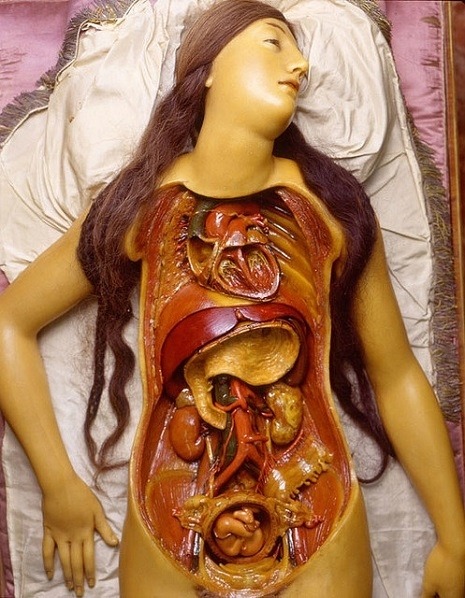

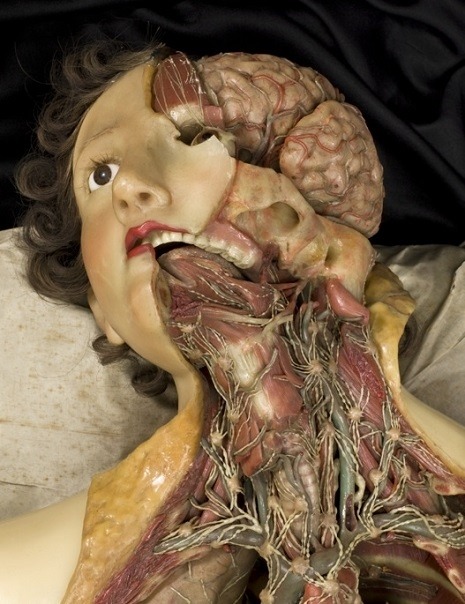
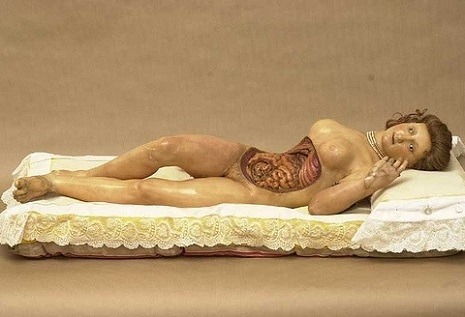
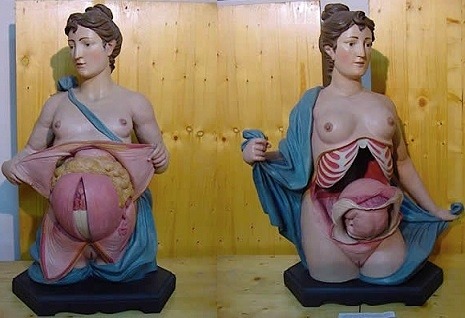

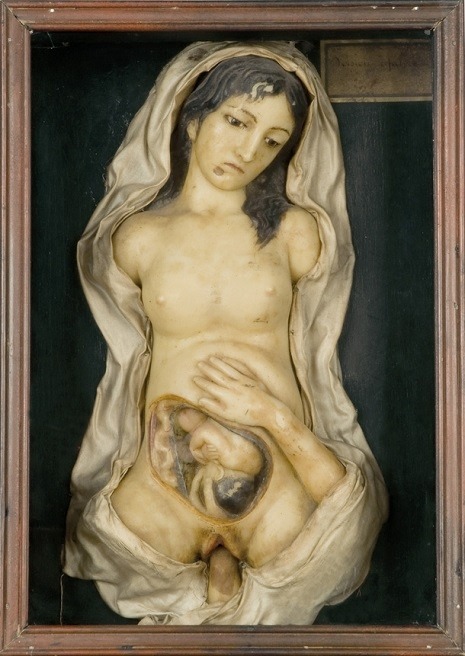
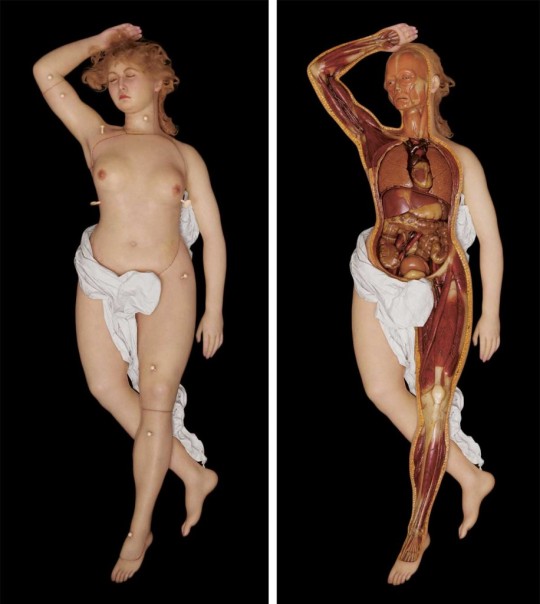

The Anatomical Venus
Between 1780 and 1782, Clemente Susini created the Anatomical Venus. She was conceived as a way to teach anatomy, cadavers being in short supply for reasons of medical ethics, rather than any shortage of death. Lifesize and made of wax, her prettiness is self-evident, and in case you missed it, adorned with a string of pearls. Her eyes are dead, unmistakably and her hair is real human hair. She is fashioned of seven anatomically correct layers, which the keen student can pull apart, ending in a teeny foetus curled in her womb.
It is genuinely difficult to pinpoint how unsettling it is, what an act of violence has been perpetrated by the accuracy of the rendering. There seems to be something blasphemous, inhumane, in creating a corpse and trying to beautify it – or rather, in considering beauty to be a necessary trait in an anatomically accurate dead body. In taking beauty to be such a critical component of womanhood, it misses, and seals in wax its own misapprehension of, what beauty is. Attractiveness and life are indivisible: there is nothing in natural life that is prettier dead than alive.
Necrophilia is a taboo for a reason. It is not what it says about, or does to, the corpse that makes it aberrant to desire it. It is what it says about your desire for women en masse, that you could see the appeal of a dead one: it is the logical end point of objectification, perceiving the physical traits to be so important that they continue to entice even after the life to which they were attached has been extinguished.
Joanna Ebenstein’s sumptuous and therefore even more disgusting book is fascinated by this era, in which “the study of nature was also the study of philosophy”; in which a body created for medical purposes could also be read as a work of art. Perhaps it is so horribly magnetic for purely anachronistic reasons: we are so used to the separation of body and mind, science and philosophy, that when we see that separation elided we cannot help but read in some insult to the spirit to see it reconnected with its own internal organs.
The aesthetics of anatomical drawings and models had been prized for some centuries before Demountable Venus, on the basis that, in order to be interested in the inner workings of the human body, men must be seduced by it. “Anatomy,” wrote Andreas Vesalius in 1543, “is an important part of natural philosophy; since it embraces the study of man and must properly be regarded as the prime foundation of the whole art of medicine and the source of everything that constitutes it.”
It is interesting to consider that the body – its nuts and bolts, the raw mechanics of it – had by this point long been considered a proper subject for artists. Leonardo da Vinci had dissected more than 100 bodies himself earlier that century, and a younger artist, Michelangelo Buonarroti, accepted a commission from a church for which he was paid in corpses.
Naturally, though, there is a piquancy to the female cadaver, not simply because of these hideously orgasmic expressions juxtaposed against intestines. It is a given that a woman’s body will be dismembered by life, and only by good fortune, put back together again. (The simplest for-instance: after a friend had a caesarian, her husband said, “I’ve seen a part of my wife no other man will ever see. Her kidneys.”)
In so many of these figures, almost all of them pregnant, the woman’s face is so idealised and the foetus so carefully rendered that she looks like the doll, and the baby like the human. The idea that beauty doesn’t simply cling on past the end of life, but is actually intensified by death, is explored by increments, so that Edgar Allan Poe’s contention that “the death of a beautiful woman is, unquestionably, the most poetical topic in the world” slips, tracelessly, into historian Philippe Aries’s, that “the dead body becomes in its turn an object of desire”.
The Anatomical Venus is literally uncanny, by Freud’s definition (borrowed from Schelling), “everything that was meant to remain secret and hidden has come into the open”.
https://www.google.com/amp/s/amp.theguardian.com/artanddesign/2016/may/17/anatomical-venus-anatomy-human-biology-joanna-ebenstein-books
116 notes
·
View notes
Text
"Clouds of Horizont"
Part[1]
Okay, wow, as we all know, the beginning of the end, a.k.a. "Clouds of horizont" is out now and i watched it and i feel the need to talk about this so damn much! Also, my ted-talk about this episode goes a little longer, because i want to add pictures and tumblr has a limit of 10 pictures, so look on my account for other posts, if you're interested^^
Okay, now moving on! Also, for those who didn't watched it: Spoiler Alarm!

We beginn at first with Belos, charging the portal and probably prepares to open it after the day of unity. Than we can see how the collector talks to him and insecures him with some valid question.
"You nervous? You haven't open it since how many hundreds of years? What if it's all changed? What if YOU changed? You got so used to eating palismen, you can barely keep your human shape anymore!"

That irritates Belos, trys to hit him with his deformed body and we can notice: the collector is right, his human body doesn't really seem like a normal human body.
Also, it kinda reminds me of Jean-Lucs Body:



Another detail, look close:
You can also see, Philipp's hand is shaking. His body is still hard to control/has not much control over it, even though he destroyed the inner palismen in "Hollow Mind".
Furthermore: The collector tries to convince Belos/Philipp to make another Grimwalker, but since Hunter is still free and not dead, he doesn't want to make another one till he kills him.

The Collector now reminds our favorite villain of his promise- to free it. My theory would be, that Belos/Philipp needs Hunter to free the collector. Maybe that were "the big plans the titan had" for Hunter. Than Belos reminds the Collector, that it needs to first fullfill its promise to make the draining spell work or he won't free him.

Now the day of unity beginns, all preperations are made and all the witches on the boiling isles are coming to the head, in which the collector and Belos/Philipp sit. The Intro is totally cut out, until the banners of the owl house, and some mystic music makes it sound spooky and gives angsty vibes, so everyone can see and hear, what is obvious: We are in the final.

The episode shows us Blight industry and an annoyed Kikimora, who got a demotion and clearly looks pissed as fuck, while Odalia talks to her about some orders for the emporers coven. Our little red gremlin drives a zeppelin similar thing to fly abomatons to the head of the Titan, which is in Odalia's opinion perfect for Blight-Industry.

But the Blight-Siblings want to show their parents, about what the day of unity really is. The twins already say, there is no way, that their mom would listen to them, even though Amity has faith in her father, that he would believe her, which is actually cute and shows how their relationship slowly improves.

Either way Alador and Odalia talk. Alador mentions his doubts about the orders, because why should they need that much security for the day of unity? But Odalia seems like to blackmail Alador by mentioning a deal between them and saying, that the kids should be more involved in Blight-Industries. Looking at Amity, being forced to fight against the demo-abomatons in shows of the Blight-Industries, it makes me questioning it: How should they be more involved? And what paperwork about what? We sadly don't get any answers, because Odalia finds her kids and grounds them.
[That was Part 1, for Part two about my prep-talk about this episodes, look at my account and please share your theories with me!]
#toh amity#the owl house#the owl lady#day of unity#theory#toh#toh odalia#toh alador#toh kikimora#toh belos#toh phillip wittebane
13 notes
·
View notes
Text
T.M.I X Your father
Oh God Rebecca felt the panic rise "not now" she cried to herself. She cursed herself for ignoring the chocolate cravings.
She chewed her inner lip contemplating her options
Emergency tissue tampon? No. That wont work
Sock? God no
And then there was the mess.
She sat, feeling defeated "fuck sake" she hissed, why was the only person home her father? "Pappa" she called out, not particularly loudly
"Yes" he replied tentively, he only got Pappa in that sickly sweet voice when she wanted something
"Come here for a moment" she also did not need to specify her whereabouts, her heart thudding in the empty house was like a beacon
"Are you alright my sweet?" He asked in a delicate tone. He knew of course he bloody knew
"I uhm-" she cleared her throat. God it was a normal thing, her mother was human. He was a doctor. Lord only knows the things he had seen. So why was asking him to retrieve a tampin from her bodycare draw so difficult? "I - well i hmmm" she turned to the colour of the darkest red known, her cheeks on fire
He sighed "what do you need and where are they?"
"Bottom draw, yellow ones. And the wipes next to them" she heard the tap of his shoes as he walked the hallway to her room "AND A GREEN BAG"
She breathed a sigh of relief when he knocked on the door, leaving the goods outside and left swiftly leaving her in peace. Before she corked mother nature, she made great efforts to scold her traitorous ovaries "you and i need a long discussion about your timing young lady" she hissed "you are a week early"
"Where is it?" She was almost in tears "i swear to God if Philippe has -"
The clearing of her fathers throat and the sight of him holding the tub of icecream made her her heart skip a beat "i also went out for those weird chocolate biscuits you love" he handed her over the tub (chunky monkey, because its elite) and spoon "come on"
She was bewildwered for a moment, right until she caught a glimpse of the hot water bottle, blankets and rolling credits for Finding Nemo "you're my favourite father" she squealed, wrapping her arms around his waist in a tight hug "love you Pappy"
"I love you too, and dont ever be embarrassed to ask something of me. Ive seen enough"
She curled into his side, reciting almost word for word the entire script of the film. It was the perfect day, minus how many tears she shed from being over sensitive "best day ever" she whispered, just as Marlin and Nemo reunited
"Hmm" he tighted his arm over her shoulder "And when your mother gets home we will be discussing the box of protection packed away under your socks" he felt her stiffen, heart erratic "you best think of some excuses young lady"
Fuck fuck fuck "Worst day ever" she pouted, unknowingly to her he had also texted her brothers and Uncles. In under 24hours the entire male brood that made up the family and scion would barge through the door demanding answers from their 17 year old baby.
38 notes
·
View notes
Text
Ezekiel reyes x reader
A/N: I’m new to posting/publishing my works so any feedback is welcomed! Maybe will do a part 2?? Depending on you readers. Also don't be shy to ask for more characters or different shows. ☺️
Summary: Ezekiel leaves their romantic partner high and dry as he deals with supposed club business. Y/n feeling quite lonely sends an attention grabbing video to Ez only for his phone to be left behind. After a confusing phone call with Angel, y/n decides she needs to see who Ez has been talking to. When Ez’s past crashes with his future puts Y/n in a bad position, y/n must figure out what’s better for her future and their relationship.
Warnings: Mature language, smut, oral sex, fingering, masturbation, mention of bodily fluids, mention of abuse, angst.
Word count: 3073
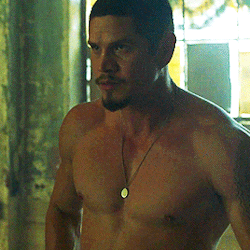
~~~~~~~~~~~~~~~~~~~~~~~~~~~~~~~~~~~~~~~~~~~~~~~~~~~~~~~~~~~~~~~
Light shuffling wakes me from a blissful dream. My eyes adjust to the light shining through the window blinds. I rub the sleepiness away and make eye contact with the bare back of Ezekiel Reyes. Shamelessly, I take in every inch and mark of his body, happy that he's mine.
Ez turns around feeling eyes on him. "Like what you see cariña" (darling) the corner of his mouth curves up into a devilish smirk.
I'm sure I'm drooling at this point. Recapturing my composure, I throw a pillow at the back of his head. "It surprises me that your ego is bigger than your head" I retort.
He turns away from the dresser facing me “you didn’t mind my head size when it was between your legs,” a shit eating smile filling his face.
“Ezekiel Reyes!” I scold giggling. Warmth floods my cheeks as I hide underneath the covers. Large hands make they’re way up my legs, kisses trailing close behind them. My breath hitches as his lips make contact to my inner thigh. His teeth nip at certain spots making sure to leave many love bites. My fingers scratch the back of his head leading him further up to where my body most craved. He licks my slit, his focus now on teasing my clit.
A soft moan escapes my lips as my hips involuntarily buck up closer to him. Ez smirks kissing up to my sternum. He looks up to me with mischievous eyes. I pout from the loss of contact, “you just want to get me worked up.”
His hand molds my breast while playing with my nipple, “You look so sexy when you’re frustrated.” His hot tongue connects to my erect nipple sucking and tugging lightly, the other hand not stopping its menstrations. He bites the side of my breast causing loud moans to escape.
My hips grind against his abdomen looking for friction and much needed relief. “Fuck.. Ezekiel” my nails scratch along his shoulders driving him further on. “Please mi corazon” (my heart) I moaned, needing more of him. His hand leaves my breast, sliding down to where I ache the most. Two digits pump in me while his thumb gives attention to my clit. I ride along Ez’s hand getting closer and closer to my climax. His fingers feel like magic, hitting every sensitive part. I’m arching from the immense pressure of pleasure that’s fighting to be released. Just as I’m reaching the edge a ringing freezes Ez’s actions. Ezekiel looks to me, then to his phone across the room on the dresser, then back to me. “Don’t you even think about it,” The need for release takes over my emotional state.
Ez kisses my forehead, “Lo siento mi amor.” (I'm sorry my love) He climbs off of the bed making his way to the dresser and answers his phone. He turns away from me talking low to the person on the receiving end. I don't know if it’s my sexual frustrations or the fact that he’s acting sneaky but something was definitely up. Ez’s hush conversation ends as he rushes to get his clothes on. I sit up worried, “Is something wrong with the club? Is Angel alright? Bishop?” Here I am frustrated since we didn’t finish, yet my Mayan family could need help. Even worse they could be hurt. God I’m so selfish.
“No hermosa, everyone is fine. The club needs me for a run. I can’t say no to them,” He eases my mind. “Rest baby, I’ll be back before you know it.” He kisses my head rubbing the crease on my forehead.
“Be careful, I know it's just a run but things can go bad so quick, so please be careful.” I hug him snuggling my head to his chest hearing his beautiful heart beat.
He rubs my back holding me close, “See you in a few, sleep mi corazon” He takes my face in his large hands planting a soft kiss to my lips. After a brief moment he lets go and grabs his kutte from the corner chair. I hear the door close seconds later and sigh sadly. He just left and I’m missing him like crazy. I’m so whipped. Maybe I should show him how bad I’m missing him.
Grabbing my vibrator from the nightstand drawer, and setting my phone on the stand to catch all my naughty actions. I flip the switch to High on my vibrator moving it along my wet slit. The vibration re-excites my sensitive clit, as I rub it through my folds, lubing it up. My other hand finds my breast playing and tugging my nipple. “Ezekiel I want you so bad baby” I moan imagining his hands, his tongue, his huge thick cock. “I want you fucking every bit of me to pieces.” I rub against the vibrator gathering friction on the bundle of nerves. Feeling tired of waiting for release I thrust the vibrator into me. Not stopping to get used to the size, I thrust it fast in and out of me hitting my g-spot repeatedly. Taking my hand away from my breast I moved it down to my clit rubbing the sensitive bud to push me over the edge. “Fuck! Right there Ezekiel!” I moan arching my back. A split second later the burst of release and pleasure fills my body. I take the vibrator out seeing my cum drip along the sleek tool to the tip as I rub my orgasm out. “Would’ve been better if you were actually here,” I look at the camera. “I miss you, baby. Come home soon. I love you,” I blow a kiss toward the camera and end the recording.
After a long hot shower, I lather myself in lotion and get dressed. Checking how the naughty video looks, I send it to Ez satisfied with the results. A ding sounds from across the room. Investigating where the sound came from leads to Ez’s forgotten phone. For someone with great memory he forgets a lot of stuff. I’ll call Angel to let Ez know.
“Hey princess, you finally wise up and realize I’m the hottest Reyes?” Angel answers.
I roll my eyes laughing, “Sadly you’re mistaken Angel, Philippe will always be number one.”
“I’m gonna tell Ez you said that.”
“What makes you think Ez doesn’t know,” I smirk.
“Gross” he groans is distaste.
“Like your face. Anywho, how did the run go?”
“What run? Everyone is given the day off until the party tonight”
Confusion wracks my brain, “none of you went on a run this morning?”
“Not that I know of. What’s wrong?” He asks worriedly.
“Uh nothing, I just thought Ezekiel was with you and the guys. My mistake, sorry to bother you Angel.”
“You’re no bother princess, let me know if you need anything.”
“Okay thanks Angel, bye.” My heart sinks. Ez lied to me. He actually lied and broke his promise. Why would he do that. It has to be important if he needed to lie to me. Yea that’s it.
I look towards his phone thinking back to who he was talking to earlier. If it wasn’t the club then who? Going against my conscience I look through his messages to see Emily pop up on his recent. The messages showing meet up places on days Ez left early to do club business or met up with his dad. My heart is breaking into pieces. Shattering even more with the lies and betrayal. He knew how I felt about starting this relationship, about the trust issues, and trauma. He knew every part of me yet decided to destroy all that was built between us. Liquid drips onto my arms, I wipe my eyes not realizing the tears pouring. I don’t want to cry. I shouldn’t cry. Not over someone who didn’t truly love me. Yet I cry for the love that I gave him. I cry for being dumb enough to fall so hard for him, for giving my all to him.
~Months prior~
Slowly slipping out of strong arms I reach for my shirt and panties laying across the floor. Trying to be stealthy, I look for my missing shorts. How can someone lose shorts in a trailer?! There’s literally no way it’s too small, but of course my luck. I yelp as I feel myself being pulled back into a warm chest. Ez chuckles beside me, happy to catch me by surprise. “Buenos dias hermosa” (good morning beautiful) He kisses my temple leading more down the curve of my neck.
I hit his firm chest, “You scared me half to death, jerk!” Trying to hold back my smile, but Ezekiel being Ezekiel can see right through it.
His hand frames the side of my face as his thumb lightly trails across my bottom lip. “You weren’t trying to leave without saying goodbye were you?” His brown eyes bore into mine taking in every feature.
Not able to lie to him, “Yes, but only to get to the office before Chucky,” I explain while trying to climb off the bed again only to be pulled back to straddling Ez’s waist. “This is what got us in this situation in the first place, Reyes,” pointing to our current position.
His big hands slowly crawl their way up my bare thighs causing shivers to run up my spine. “You’re too irresistible, and you didn’t seem to mind it. I do remember you begging for more.”
Curse his memory. I hit his chest, ”Not my fault you kept following me around, I felt bad. You were like a lost puppy.” I smile thinking back to the first day we met. “Speaking of memory, where are my shorts?”
A mischievous smirk slips across his lips, “now what do I get if I tell you?” His hand now on my ass, pushing me slightly on his erection.
I jokingly ponder his question, grinding my hips slowly to tease, while tapping my chin in a thinking motion. “Hmm.. Not getting caught by Bishop, nor beaten to death. Oh and possibly get buried in the desert.” His smirk falls off his face. “But knowing Bishop he’ll probably castrate you first,” I grin thinking how protective the Mayan President can be.
He groans, pulling my shorts from behind his pillow. “Take them.”
“You were hiding them!” I laugh pinching his side teasing.
“I didn’t want you leaving,” he taps his finger along my thigh nervously.
“As sweet as that sounds, I don't want your death on my hands if Bishop catches us,” I joke.
“I want Bishop to know,” he states confidently. He sits up having us chest to chest as he watches my features. “I want us to date, be a couple in front of the club, in public. I don't want to hide it,” his hand caresses my face.
“Ezekiel,” I stop his hand. “I can’t do that. I can’t put sheer dumb trust in another person, not with my emotions and body.” Heat fills my chest from the traumatic memories. “I will not put myself in a position to be beaten down and taken advantage of.” Slipping out of his hold, I put my shorts and flats on trying to make a quick exit.
His hand gently wraps around my arm catching my attention. “I don't want you for your beauty and body, you’re so much more than that. You’re so strong and very smart, your humor and wit make you, you.” His arms wrap around my waist pulling me a bit closer to him. “I will never hurt you. I’m not that low life thug. I will never lie to you or make you feel uncomfortable. I respect you so much. Just give me a little trust, I promise you won't regret it,” he begs, his eyes full of love?
A knock on the trailer door interrupts the moment. “It’s Chucky, I brought by coffees for a morning wake up,” he explains happily.
I walk over to the door, opening it coming face to face with Chucky. “Thanks Chucky,” I take the two cups. “Do you mind letting Bishop know that I need to talk with him? He’s gonna wanna know I’m dating his prospect,” I look over to Ez smiling.
“Of course young love is beautiful, I hope to witness it myself one of these days.” Chucky sighs dreamily.
I peck his cheek, “You will Chucky. She’ll be one lucky woman,” I assure him.
Muscled arms snake around my stomach as Ez’s chest warms my back. “Chucky, y/n is gonna be late to clock in. I won't keep her for too long,” he kisses my temple.
“I love you Chucky, thank you!!” I squeal as Ez shuts the door and picks me up kissing me all over the face.
~End of Flashback~
My phone ringing brings me out of my haze. I answer it hearing the one man I didn’t want to contact. “Hey I’m calling from a pay phone, I think I left mine on your dresser. Any way I’ll be by to pick you up for the party tonight in a few minutes.”
I hold back from crying anymore, not wanting to show how hurt I am. “Don't worry about me, I’ll drive over by myself,” trying to keep my voice steady.
“Are you sure the house is on the way.”
On the way from where? Is what kills me. “I’m sure. I’ll see you there, bye.” I hung up before he could get another word in, not able to handle a longer conversation. Grabbing a duffle bag from the closet I pack every belonging of his. Erasing any sign of him from my home. As I fold the last of his shirts, his scent takes me in its embrace. I’m really going to miss him. Holding his shirt to my chest I hug it letting the last of my tears drip away.
After pulling myself together, I toss his stuff in my Jeep and head over to the club house. Chucky opens the gate and greets me. “Lovely night to let loose, huh y/n?”
I can’t help but always feel comfort from Chucky, he’s a true sweetheart. “Indeed Chucky. Make sure you get to enjoy the party a bit too.” I pat his arm before driving into the lot.
Hopping out, I head into the clubhouse to see Bishop playing a card game with Hank and Reaper. I greet the men hugging them one by one, leaving the last to be Bishop. “Can I talk to you in the temple?”
He nods a look of worry flashes across his face, “Of course mija. We’ll be back.” He tells Hank. We walk back to the temple, him taking a seat as I stand. “What’s wrong y/n? Did something happen?” He scopes out my face for any bruise or marks.
“Yes but it's not for you to worry about, Bish. Just letting you know I’ll be in Charming for the next couple of days.”
“Why are you leaving? Did the prospect do something to you?!” He starts to stand up to head toward the door.
I stop him shaking my head, “There is a job opening at the hospital there that I’ve been invited to try out. I think it’s a great opportunity for me since I’m back on my feet.” I explain leaving Ezekiel out of the situation.
“But that’s not the only reason. You look like you’ve been crying. What did the prospect do.” He demands an answer.
“Nothing that deals with the club. He didn’t touch me nor hurt me in any physical way. I can’t deal with being in a relationship, they don’t work well with me.” There’s no point in getting Ez into trouble with the club.
He gets up and embraces me, “If that’s what you want then I can’t stop you. Just make sure you’re doing it for you and not just running away.” He kisses the top of my head.
“I’ll call you when I get to Charming,” I pat his chest. “Please keep this between us, for now?” He nods his head in agreement. “Thank you for everything, El Presidente” I smile leaving him to head back to the Jeep. As I exit the club I come face to face with Ezekiel.
He smiles seeing that it’s me, “There you are hermosa,” he leans down to peck my lips. I step back avoiding the gesture. Confusion washes over him as I step around him to get to my car. He follows close behind, “Hey, wait up!” He grabs my arm only for me to yank away from him. “What’s wrong mi amor?” (my love)
“How was your run?” I steal my voice, staring at his brown orbs.
Worry taking over his emotions, “It was fine, everything went well. I’m okay.”
I scoff shaking my head at his lies. “Here,” pulling his phone out of my pocket and shoves it into his chest. “Emily has been messaging all day.”
Realization flashes through him, “wait baby no it’s not like that!” He tries to grab my hands.
“Don’t touch me. You lost the privilege the moment you decided to lie and sneak around. I don't want any part of your charades.” Tiredness heavy in my voice.
“Let me explain, please,” he pleads. “I didn’t cheat. I only helped her with a business issue,” he explains hurriedly.
“I don't need your explanation nor do I want it, Ezekiel. It’s not fair for you to live in your past, while you tell me to move on from my own. It’s hypocritical of you to think she loves you. Emily is a married woman, she loves Galindo, she’s moved on.” I sigh grabbing his duffle bag of belongings from my car dropping them at his feet. “At least I know I’m not the only stupid one in this relationship.”
“I don't love Emily, I love you, you are my everything. You make everyday worth it. I can’t lose you.”
“The problem, Ezekiel, is I don’t believe you. Your words are just that. Words. No meaning behind them. I’m not gonna give my time and trust to a man who doesn’t respect me. I’m done. It’s over. Don't contact me, don't go to my house.” I rush into the Jeep starting it and backing up out of the lot. The only thought is to drive away and don't look back. If I look, then I know I’ll turn and go back into his arms.
A/N: please feedback and let me know if there should be a part 2
#ezekiel reyes#ezekiel reyes x fem reader#mayans#SOA#ezekiel reyes x reader#smut#SOA SMUT#angst#ezekiel#reyes#angel reyes#mayan mc
110 notes
·
View notes
Text
EMMA & ELECTRA.
@theasteriae wrote:
It’s gaudier in here than things are at The Asteria ( signs in pink cursive, lights the same colour illuminating the central bar, where there’s a precarious tower of champagne glasses and a constant flow of the drink through them ), but the atmosphere makes a nice change. Conversations interspersed with laughter, instead of the whispers that plague corners of Aidan’s club even now, two years after he’d reopened. And it’s nice to move through the crowds rather than feeling them part on both sides of her like the red sea under the cold grey eyes of her husband. Queuing at the bar, while a novel experience these days, would have been less enjoyable, but luckily, there are servers on hand with trays of champagnes, and when offered one, she takes two, in case they don’t pass by again.
She had come here with Ram and Cecelia, but somewhere in the press of bodies, she’s lost track of them. He’s probably at the bar, making trouble if he can’t find it organically, and she—Electra scans the room again—Cee’s over six foot tall in heels, she should be easy to spot, but Lex can’t see her anywhere—was probably accosted on her way to the same place by someone she knows. Or someone who knows her. It’s happened to Lex a couple of times too, a hand coming out of nowhere to catch her by the elbow, bland smiles and small talk she can barely hear over the music until they move on, and she finally realises where she’s supposed to know them from, if she does at all. That’s the trouble in their line of work; people think they know you because they know your face, while you’ve never seen them before in your life.
The focus of the evening is ostensibly the watches, which are being showcased in glass display cabinets on a platform at the end of the room, under a set of hot, bright spotlights. She lingers there, thinking maybe her brother or his girlfriend ( her best friend ) will wander over before too long, and snaps a couple of pictures. When she unlocks her phone, she sees a message from Fitz.
Having fun? x
He gets a selfie in response, the gold sequins on her dress glimmering when the camera flashes at them. Around her, other people are also taking photographs, but there’s one woman just standing there, scrutinising the watches. It’s a look Lex has often seen on members of the press who are called in to report on these events. She looks down at her wrist where a diamond encrusted Raymond Philippe watch is glittering under the neon lights of the nightclub. A present from Aidan for her last birthday. Then she looks at the watches on display, the price list, and the woman again as she speaks.
“To most of the people here,” she answers. Herself included. Her lips curve upwards at the corners, not quite amused, but getting there. “If you want my advice, drop the tabloids and start blogging instead. Then they send you them for free."
Emma surveys this woman. Does she recognise her? Why does she feel as if she knows her? Emma's mind flits between sources as the woman's cool gaze slides over her: one of Charlies' friends, a news reporter, actress, model...? Ah, of course. The woman's words click as her mind settles on her true identity. @MrsFitz.
Emma might not have much time for social media (far too much world-building, very little of it genuine), but she does have time for the odd Glamour Magazine in the bath when Charles is at his sqash club. She has seen those glossy caramel curls tumbling across several spreads in its pages, always accompanied by excerpts from her social media and paparazzi shots.
"Maybe I will," Emma responds. Her highlighted cheekbones lift as her expression glosses into a smile. She holds out a ringed hand to shake the woman's, both politely laughing as her companion is forced to juggle two champagne flutes in one hand to complete the act. "Emma Robertson, London Journal, although it's not exactly exclusive. I do bits and bobs for a few places, nothing really seems to settle. Too much to write about, and not an ounce of it interesting." Not that one can find anything 'interesting' when one's brain is numb from anti-depressants, but she won't mention that.
Her hand lingers a moment longer in Electra's before she drops it. Her thumb notices the smoothness to the back of her hand as it is withdrawn - what is that? A hand cream?
"Beautiful tattoo," she comments, flicking an eye to the constellation she has noticed inked delicately on the back of Electra's other hand. "Does it have a significance? I'd like to say mine do but truth be told they're just pretty symbols I saw in the back of a hippy shop in Kathmandu." She wiggles her ringed fingers so the Hindi symbols below her inner two knuckles catch the lights from the display cabinets.
More twenty-something influencers are pushing their way to the watch cases behind them. Emma sinks the remainder of her champagne. "There's a booth over there. Shall we sit? You can tell me all about your tattoo and what brings you to this...sparking... event. Please say it's not just to sell watches?"
2 notes
·
View notes
Text
Nice Jewish Girl Runs Away From Home, Becomes Tantric Lama
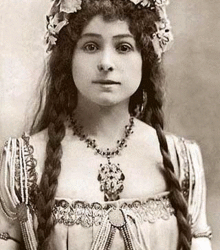
Alexandra David-Neél was a Franco-Belgian singer, explorer, author and Tibetan Mystic who became a Tantric Lama. She was the first westerner to visit the forbidden city of Lhasa in the year 1916. Long before Heinrich Harrar spent his 7 years in Tibet making nice with the Dalai Lama, Alexandra had been there, done that, and why her life has never been immortalized on film remains a mystery that only the Hollywood patriarchy can answer. She wrote over 30 books covering the subjects of Buddhism, Tibetan Tantra and Esotericism and that’s just for starters.She was also a much accomplished and sought after translator, being fluent in French, English, Sanskrit and Tibetan. Sadly, only two of her books are still in print today: “My Journey To Lhasa” and “Magic and Mystery in Tibet”. Alexandra lived to the age of 101 and to this day remains the most authoritative source for Tibetan Tantric Buddhism.
Alexandra was born in Paris, October 24, 1868 to an anarchist father who nearly escaped execution by firing squad after the failed revolt of the Paris Commune and a mother who was a deeply religious, conservative heiress. This social incompatibility led to many arguments between the parents during Alexandra’s formative years. No doubt this created a pattern in her life of wanting to runaway from conflict and instilled a desire to find balance through travel. Her earliest attempt to runaway was at the 5, she only got as far as the local park before the Gendarmes found her and promptly returned her home. This was the first of many attempts to runaway until she reached adulthood and was able to claim her inheritance; allowing her to satisfy her wanderlust. I myself being a product of a dysfunctional upbringing, related to many of her situations, which made her story to be particularly compelling on a very personal level.
Throughout her childhood and adolescence, she would find the opportunities to escape her bourgeois surroundings in search of adventure: While vacationing with her parents Belgium, she ran away to the Netherlands, was found and returned home. Later that same year, she embarked on a bicycle trip from Paris to Spain, “forgetting” to tell her parents, naturally. But perhaps her most ambitious and successful attempt to fly the coup was at age 17, when she boarded a train from Brussels to Switzerland, hiked across the Alps where she wound up in Lake Maggiore, on the Italian side of the Alps. This last escapade was certainly a primer for her future adventures in the Himalayas. As she loved to say about herself: “I learned to run before I could walk”.
When she turned 21, she moved out on her own and set herself up in Paris, where she enrolled in the Paris Conservatory of Music while at the same time began to study esoteric traditions with the well known mystic of her times, Madame Blavatsky. She also discovered Paris’ venerable museum to Asian art and culture: Le Musée Guimet; which still exists today. It was here that she fed her hunger for exotic cultures, traditions and converted to Buddhism. Right around this time Alexandra received her inheritance and she flew the coup once again, this time to India. She traveled through India, studying Sanskrit, visiting temples until she ran out of money and returned to Paris.
Upon her return to Paris, she sadly discovered that her desire to share the experiences of her visit was met with antipathy. Since women did not do those things and studies of other cultures were done from an observers point of view. Not as Alexandra had done, as a participant. Needing to find gainful employment, she fell back on her earlier training in voice to pursue a career as an opera singer. As a singer she achieved a fairly acceptable amount of success, traveling the world and finally landing a permanent residency at the Saigon Opera. She even found the time to compose an Opera herself! She continued traveling the world and while performing a gig in Tunisia, she met the man who was to become her husband and would be the facilitator of some of her greatest adventures. Philippe Neel was a civil engineer who worked for the government of France and like Alexandra was extensively well traveled as a result of his job. Together they had an unconventional marriage by the norms of the times. It could be called an “open marriage” but open only in the sense it was Philippe’s support of her travels that facilitated some of Alexandra’s greatest adventures. But let’s not confuse Philippe for a pushover, because underneath all the generosity was an ulterior motive: Philippe also had a mistress and dispatching his wife off to yet another globe trotting mission kept her out of the way. All evidence suggests that Alexandra was ok with this and chose to look the other way.
The Ultimate Late Bloomer:
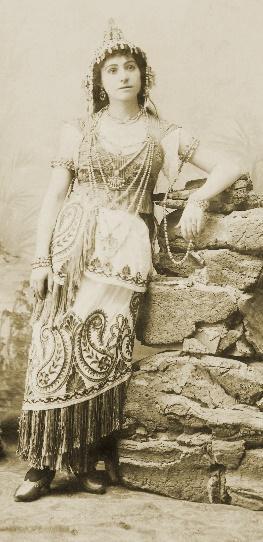
On August 9, 1911, with her husband’s blessing, Alexandra returned to India. She told her husband she would return in a few months. She would be gone for 14 years. But during all this time Philippe was supportive both emotionally and financially. The letter between them prove this. Even though there was little physical connection between them, their correspondence reveals a strong intellectual connection and more importantly, a heart connection.
Upon arriving in India she travelled north to the Himalayan Kingdom of Sikkim where she was a guest of Maharaja. Here she met the Dalai Lama, whose only advice for her was “Learn Tibetan!” and a great Buddhist mystic named Lachen Gomshen Rinpoche (more about him later). In one of the monasteries she met a teenager named Lama Yuphur Yongden who would become her lifelong companion and whom she would eventually adopt as her son. The proximity of Sikkim to the Tibetan border sparked Alexandra’s desire to visit the forbidden city of Lhasa, which was closed to Westerners. But with no success; she did cross the border illegally a few times but was turned away.
During her mentorship with Gomshen, she lived in an anchorite cave. Essentially as a hermit, practicing yoga, Tibetan Tantra and the study of Buddhist Scriptures. So accomplished did she become in her studies that she was awarded the title of “Lamani” (female Lama) and “Kadoma” a reincarnated female spirit. As a result of this she was allowed to wear the sacred red and white vestments of a Lama as depicted in the pictures here.
On July 18, 1916, she once again attempted to illegally enter Tibet, hoping to make it to Lhasa. She did manage to visit a few important monasteries and struck up a friendship with the Panchan Lama and his mother. She was given an honorary Doctorate in Tibetan Buddhism by the Panchan Lama, who wanted her to stay on as his guest. But Alexandra refused, wanting to return to Sikkim. This was to prove to be a great error on her part. Once she returned to Sikkim, she learned that her actions had sparked the ire of the British Colonial Authorities. Remember ant this point in time, Sikkim, India and the rest of the kingdoms of the subcontinent were under British colonial rule and travel to Tibet was forbidden. So consequently poor Alexandra was kicked out of the country.
This began Alexandra’s Iliad through the countries of Asia. Since WW1 was raging throughout Europe, it was too dangerous to go back. Instead she headed east, visiting China, Japan, Korea, and Mongolia with the faithful Yongden at her side. Determined to return to Lhasa, she and Yongden devised a plan where they would attempt to enter Tibet by traveling from Mongolia, via the northern deserts through the shared border of China and Tibet. In order to make her entrance with as little fanfare as possible (it’s obvious by now that Alexandra had a flare for the obvious) she darkened her skin with soot, dressed in rags and passed herself off as Yongden’s mother. A foreshadowing of things to come. This time her journey was a success, by now it was 1924 Alexandra had now been wandering the face of the earth for almost 14 years. Even though she had achieved a personal Nirvana, Alexandra felt the need to return home. So she packed up and returned to France with her companion Yongden in tow and returned to France
Inner Iliad/Outer Odyssey:
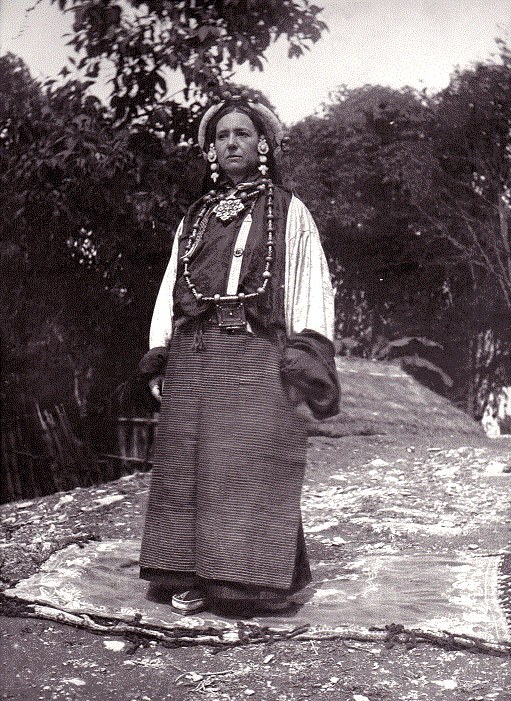
Upon her arrival in France, Alexandra discovered that she had attained something of a celebrity status in France, due to her writings, translations of Buddhists manuscripts and reports of her adventures in popular magazines. She wound up settling down in the village of Digne-les-Bains in the region of Provence. She earned a reputation as a Buddhist scholar of record. The accounts of her adventures were published in many of the major newspapers and magazines of the day. It was here that she wrote her book “Magic and Mystery of Tibet”. She worked on expanding the property and by all accounts created the first Tibetan Tantric temple in the western hemisphere.
During this period of her life from 1925 to 1937 that she began what I like to call her “Inner Odyssey”. Alexandra had clocked in more travel miles than most of her contemporaries an amazing feat for anyone back then, in particular a woman. The origins of her wanderlust began as a way of escaping from her dysfunctional past. As she progressed on her outer journey to forbidden lands, she also began a journey of inner exploration in a quest to find balance. Through the study of ancient and sacred texts, she was able to shed her outer shell to realize to achieve a personal nirvana and become a “Lamani”.
In her book, “Magic and Mystery in Tibet” she recounts many unexplainable phenomena which may appear to be inconceivable to the average Westerner. Some of which are explained here:
Tummo: The ability to control the temperature of your body. This technique came in handy for Alexandra and her companions as they hiked through the Himalayas. Since they often traveled by foot or by horse and on a shoe string budget, learning to control your body’s temperature for personal warmth or to start a campfire would become a mainstay survival technique throughout her travels.
Tulpa: This is not to be confused with the western concept of an Egregore or a Golem. A Tulpa is the creation of a physical being through one’s own thought process. In order to survive under dangerous conditions while trekking through the Himalayas, Alexandra recalls creating Tulpas to serve as her guides and to endeavor protection. Apparently none of these emanations survived for more than a few days according to her.
Bardo Thödel: A death and rebirth ritual in which the Lamas have the ability to die, and in doing so their spirits would leave their physical body and then return at will. This was accomplished by the insertion of a thin bamboo reed or straw into the fontanelle of the skull. This straw or reed would serve as a conduit for Spirit to exit and enter the body, once the magical words had been uttered. These magical words (which I will not disclose here) were also uttered when a Lama would be midwifing a transition of a human from this existence to the next Bardo. In other words, serving as a guide for them at the time of death.
Flying Yogis/Levitating Yogis: In her book “Magic and Mystery in Tibet”, she describes seeing yogis with the ability to levitate or even fly through the air to get from point A to point B. There has been much speculation about this phenomena in particular especially since many Indian Fakirs have been discredited when it was discovered that they were creating the illusion of levitation by relying on a specially rigged chair disguised with cloaks. But what Alexandra describes in her book is nothing of the sort; She witnessed grown men flying across open fields with out any visible means of support.
To the average westerner, these anecdotes may border on the delusional or ridiculous. And yes they sometimes they are a bit difficult to believe. But keep in mind of the environment and culture that produced these assertions: They were produced in the rarified air of Himalayan Kingdoms that are free of are western distractions such as internet, cell phones, televisions, traffic, unhealthy foods. These “modern conveniences” that are more of an addiction than a convenience. There the mind is free of distractions and free to manifest at will. To paraphrase Alexandra: Our thoughts manifest our reality, and the mind that is free of distractions can manifest anything. So there is no doubt in my mind that she used these techniques not only to expand her knowledge of to also heal from her fractured past, make herself whole and to impart healing to others.
Her Relevance Today’s World:
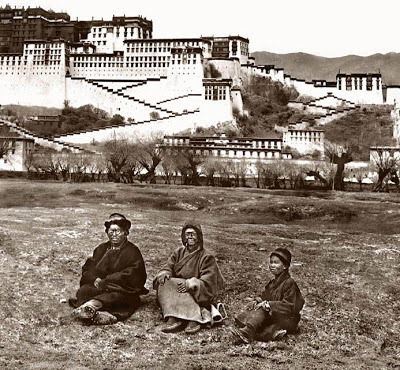
So again, to the Western mind these recollections would seem improbable, but I am here too say that one needs to take themselves out our linear Occidental mindset and learn how to appreciate how these techniques can be applied to our own urban enlightenment. The Tantric Yogis may have had the capacity to fly through the air but they would probably shrink in horror at the thought of us climbing into a big metal bird that flies through the sky. We may laugh at yogis inserting straws into their skulls in order to experience life and rebirth, but how about her modern medical traditions that keep people alive through organ transplants or defibrillation when in some cases the patient may be way past their time to transition?
Our society today is fractured, some say way beyond repair. But I refuse to subscribe to that opinion. Because if these teaching that have existed for thousands of years before our current western traditions, then they will still continue to flourish long after our ministries have been reduced to dust. Today there are advanced thinkers who would have mediation taught in schools not as any part of a religious agenda but as a way of calming a child’s hyperactive mind. As a former art instructor, I can confirm that teaching some simple breath works prior to art class can open a student’s mind so that they can experience a great creative awakening.So imagine, if we can plant a small seed of awareness, what amazing children we will create. Alexandra would have been proud. In fact there are many Tantric techniques that couples can practice in order to bring an enlightened child into this world. But this will be the topic of another blog later on.
Le Troisième Etape:
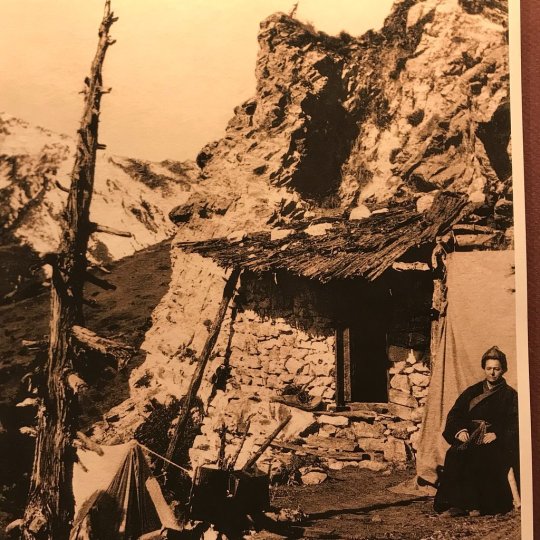
In 1937 Alexandra was now 69 years old, most people would be entering the third stage of their life, but not Alexandra; She had spent a good 12 years in Digne-les-Bagnes, making improvements on her home, expanding a portion of the structure to which she named the “Samtem Dzong” or “Fortress of Meditation”. The purpose of this structure was for the teaching of mediation making it the first Lamaist Temple in the west and it would later become part of her museum.
At this point in her life she was ready to return to her beloved Tibet and to travel through China in order to study Taoism which is the Chinese form of Tantra. This time she decided to take the Trans Siberian Express so she could enter Tibet through the Northern route. But as the fates would have it, for the second time in her life, she was caught once again in the midst of a worldwide conflict: The war between China and Japan. This event was to be a precursor to World War II and it’s ironic to think that Alexandra who many considered to be a warrior for peace, was now compelled to witness the horrible atrocities that were committed by both sides. But always wanting to make herself useful, she actually worked as a medic and a healer for both sides of the conflict.
Finally in 1938, after a year of navigating the conflicts of WW2, she was able to at last enter Tibet, where she visited monasteries, studied sacred scriptures and settled down in the village of Kangdin for what was to become five years retreat of solitary meditation. It was at the end of these five years when she learned that her husband had passed away. It was now 1946, she had been wandering through China and Tibet for 9 years. It was time to return to France in order to tend to the estate of her deceased husband. So she left Tibet via India this time, departing on a new invention called the jet plane which flew her back to Paris.
Now back in France, Alexandra settled her husband’s affairs. She stayed in at Digne-le-Bains where the accolades began to pour in as a result her accomplishments. The French government named her a Chevalier of the French Legion of Honor. She was awarded the Gold Medal by Geographical Society of France. There were streets and schools named after her. Alexandra David-Neel became the foremost authority on Tibetan Tantric Buddhism.
But fate was to give Alexandra one final cruel blow, in 1955 Yongden, her beloved travel companion and now adopted son, died suddenly of kidney failure. The years of hardship traveling under impossible conditions took its toll on his fragile body. Alexandra was heartbroken, but after cremating his remains, vowed that they would once again return to Tibet. She was now 87 years old. Even though her body was showing signs of wear and tear, there were many who said she looked younger due to her lifestyle of yoga and meditation. She continued writing, translating, teaching and became known as the “Wise Lady of Digne”. Buddhist scholars from all over the world made the pilgrimage to her house in Provence to sit at her feet and drink from her well of wisdom.
Finally, at the age of 100, she felt the need to return to Tibet and so went about filing the papers to obtain her travel visa. On September 8, 1969, she transitioned to the next Bardo a month shy of her 101st birthday and just as her travel visa was approved by the Chinese government. Her body was cremated and her ashes, along with those of Yongden, were taken by her followers to Varanasi India so they could be thrown into the Ganges River.
I would like to think that her ashes traveled the Shakti trajectory of the Ganges to the Himalayas, where her Spirit roams the sacred mountain passes as the Lamani, Kadoma, Flying Sky Dakini, always everywhere and nowhere.
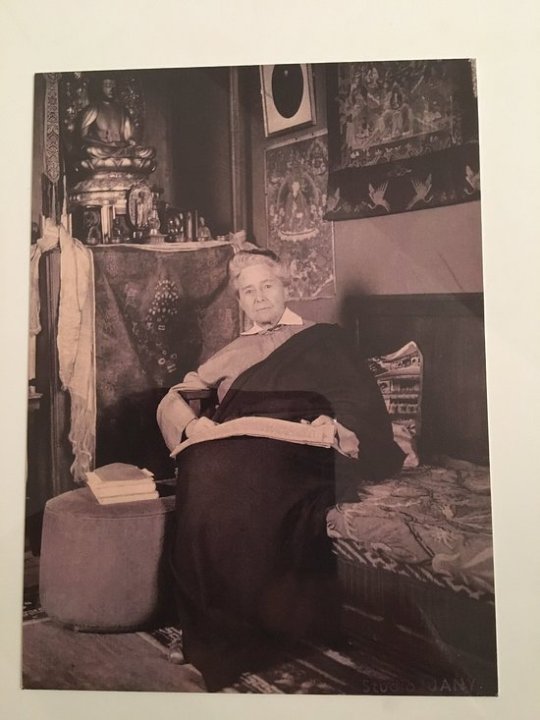
Did you enjoy this Blog? For more information, please visit my website: universaltantra.org or you can contact me by email: [email protected] or by phone: +1 (832) 743-8148
5 notes
·
View notes
Photo

I removed some books today.
I think of myself as a minimalist, but that doesn’t happen to be true. I have acquired more books than I will ever read. They still sit, stacked and unreachable, in piles by the walls, two dozen books tall and sometimes two books deep.
I don’t think I know where they all came from. I think more came from online than from any physical store. I bought them from Abebooks, the sales search platform that Amazon owns now. Abebooks tell you the names of the sellers, but they seem unconnected to any real place.
From Better World Books. From Thrift Books and Bookbarn. From Silver Arch Books, Motor City Books, Free State Books, Sierra Nevada Books, Yankee Clipper Books, and the Atlanta Book Company. From Green Earth Books and Housing Works Books. From Goldstone Books and Powell’s Books and Kennys Bookshop and Art Galleries. From Satellite Books and the Orchard Bookshop. From Blue Cloud Books and Hippo Books and Wonder Book.
They’re from all over, from places you’ve never been, places you’ll never be. They’re names on a box. But then there are the books from more intimate places, intimately connected
From library’s old bookstore, which sold paperbacks for fifty cents, hardcovers for a dollar. From the basement of the old independent bookstore down on Front Street, where they sold remaindered and overstocked books marked down with red-orange tape. From the thrift store across the street, which charged too much.
From the Chapters at the mall in your hometown, or the Chapters and Indigo in the places you’ve been to, from the shelves of marked-down items where you looked for bargains, for the books you knew you should read, and all the books you never would. Places where you could drink sweet cream and coffee and pretend to read.
From the Borders in Syracuse, where you idled while the family went to the fair, where they always said they were going to build the largest mall in America, but never did. There was another Borders in South Florida, where they were stripping fixtures from the walls because the books had not sold, and so the Borders had to be. They still have bookstores. I’m not sure what they sell now. Postcards, I think.
The books still in my room had postcards from people I will never know, dedications to people I will never see, business cards from people who have moved on to other work. But their spines are unbroken, their pages unmarked. I guess I wanted them that way. I bought them like that.
I sometimes worried they would break through the floor. I would wake up to the collapse of everything I have ever owned as I plummeted a few short feet to my death. I guess it would probably take longer than that. I would have to wait for them to crush me. That mass of books would fall on me, blotting out the light. Crushed beneath nearly everything I have ever owned.
That’s what happened to the clerk Toshiko Sasaki in John Hershey’s Hiroshima, who was seated at her desk on August 6, 1945, in front of a couple of bookcases from the factor library:
Everything fell, and Miss Sasaki lost consciousness. The ceiling dropped suddenly and the wooden floor above collapsed in splinters and the people up there came down and the roof above them gave way; but principally and first of all, the bookcases right behind her swooped forward and the contents threw her down, with her left leg horribly twisted and breaking underneath her. There, in the tin factory, in the first moment of the atomic age, a human being was crushed by books.
Miss Sasaki made out alright, although not so well as to not ask the question “If your God is so good and kind, how can he let people suffer like this?” But then, I have more books than she did.
I removed some books today. I still have more I want to remove. I just don’t have the boxes for them. I took the boxes I did have in the back of my car to a mass-market thrift store, where they will end up on the shelves by the leather jackets.
Perhaps they will end on some other shelf, like a postcard from somewhere unknown, in someone else’s memory. But I don’t think they will. I don’t think they’ll sell. There aren’t enough people here who spend money pretending to read.
I don’t know what will happen to them. I suppose they will pulp them. Or perhaps they will end in a landfill, crushed beneath their own weight, suffocating beneath the earth we have made for them until life reclaims them.
I wrote out a partial list of the books I threw out. I don’t know what it says about me. There’s a double significance here: These are books I bought, for some amount of money, but these are also books I am throwing away, because I asked the question the woman told me to ask, which was whether they sparked joy, and I answered no.
Those books in the photo are the books that have not yet been thrown away. Here, below the fold, are the books that have:
Judith Fitzgerald’s Sarah McLachlan: Building a Mystery
Mordecai Richler’s Oh Canada! Oh Quebec!
Jonathan Coe’s The Rotter’s Club
Misha Glenny’s McMafia
Joinville and Villehardouin’s Chronicles of the Crusades
Michael Ignatieff’s The Lesser Evil
Russell Dalton’s Citizen Politics in Western Democracies: Public Opinion and Political Parties in the United States, Great Britain, West Germany, and France
Richard Finn’s Winners in Peace: MacArthur, Yoshida, and Postwar Japan
Ramachandra Guha’s India After Gandhi
Fox Butterfield’s China: Alive in the Bitter Sea
Anthony Sampson’s The Changing Anatomy of Britain
Masanori Hashimoto’s The Japanese Labor Market in a Comparative Perspective with the United States
Donald Keene’s Dawn to the West: Japanese Literature of the Modern Era: Poetry, Drama, Criticism
Andrei Shleifer’s Without a Map: Political Tactics and Economic Reform in Russia
Peter Newman’s The Secret Mulroney Tapes
Nicholas Negroponte’s Being Digital
Lesley Downer’s The Brothers: The Hidden World of Japan’s Richest Family
Harold Vogel’s Entertainment Industry Economics
Stephen Goldsmith and William D. Eggers’s Governing by Network: The New Shape of the Public Sector
Donald Harman Akenson, Saint Saul: A Skeleton Key to the Historical Jesus
Philip Ziegler’s King Edward VIII
David Wessel’s In FED We Trust
Robert Dallek’s Flawed Giant: Lyndon Johnson and His Times, 1961--1973
David Halberstam’s The Reckoning
David Bell’s The First Total War: Napoleon’s Europe and the Birth of Warfare as We Know It
Kevin Phillips’s The Cousins’ Wars
Yirmiyahu Yovel, Spinoza and Other Heretics: The Adventures of Immanence
Michael Oren’s Six Days of War: June 1967 and the Making of the Modern Middle East
Lawrence McDonald’s A Colossal Failure of Common Sense: The Inside Story of the Collapse of Lehman Brothers
Richard Posner’s The Crisis of Capitalist Democracy
William Chester Jordan’s Europe in the High Middle Ages
William Cohan’s House of Cards: A Tale of Hubris and Wretched Excess on Wall Street
Bryan Burrough and John Helyar’s Barbarians at the Gate: The Fall of RJR Nabisco
Linda Lear’s Beatrix Potter: A Life in Nature
Jane Mayer’s The Dark Side: The Inside Story of How the War on Terror Turned into a War on American Ideals
Allan Brandt’s The Cigarette Century: The Rise, Fall, and Deadly Persistence of the Product That Defined America
Garry Wills’s Head and Heart: American Christianities
Sarah Bradford’s Elizabeth: A Biography of Britain’s Queen
Andrew Gordon’s The Evolution of Labor Relations in Japan: Heavy Industry, 1853--1955
John Ardagh’s France in the New Century: Portrait of a Changing Society
Bob Woodward’s The Agenda: Inside the Clinton White House
John Julius Norwich’s Byzantium: The Early Centuries
Taylor Branch’s Pillar of Fire: America in the King Years, 1963--65
Michael Lewis’s Liar’s Poker
Tim Blanning’s The Pursuit of Glory: Europe, 1648--1815
Robert Fagles’s translation of Virgil’s The Aeneid
Karl Popper’s The Poverty of Historicism
P. D. Smith’s Doomsday Men: The Real Dr. Strangelove and the Dream of the Superweapon
Richard Rhodes’s Arsenals of Folly: The Making of the Nuclear Arms Race
Margaret Thatcher’s Downing Street Years
Alistair Horne’s Harold Macmillan, 1957--1986
Taylor Branch’s The Clinton Tapes: Wrestling History with the President
Ian Kershaw’s Hitler, 1936--1945: Nemesis
David Grossman’s To the End of the Land
Sean Wilentz’s The Rise of American Democracy: Jefferson to Lincoln
Philipp Blom’s The Vertigo Years: Europe, 1900--1914
Jacob M. Schlesinger’s Shadow Shoguns: The Rise and Fall of Japan’s Postwar Political Machine
Peter Jenkins’s Mrs. Thatcher’s Revolution: The Ending of the Socialist Era
Martin Lawrence’s Iron Man: The Defiant Reign of Jean Chrétien
Marin Lawrence’s Chrétien: The Will to Win
Alastair Campbell’s The Blair Years
Tony Blair’s A Journey
David Kennedy’s Don’t Shoot: One Man, a Street Fellowship, and the End of Violence in Inner-City America
Joshua Ferris’s Then We Came to the End
Kate McCafferty’s Testimony of an Irish Slave Girl
Martin Wolf’s Why Globalization Works
Charles Fishman’s The Wal-Mart Effect: How the World’s Most Powerful Company Really Works -- and How It’s Transforming the American Economy
William Easterly’s The White Man's Burden: Why the West's Efforts to Aid the Rest Have Done So Much Ill and So Little Good
Karel van Wolferen’s The Enigma of Japanese Power: People and Politics in a Stateless Nation
Jeffrey Sachs’s The End of Poverty: How We Can Make It Happen in Our Lifetime
39 notes
·
View notes
Text
Martin Luther and Beer: the other reformation
Almost 500 years ago, an obscure Saxon monk launched a protest movement against the Catholic Church that would transform Europe. Martin Luther's Protestant Reformation changed not just the way Europeans lived, fought, worshiped, worked and created art but also how they ate and drank. For among the things it impacted was a drink beloved throughout the world and especially in Luther's native Germany: beer.

The change in beer production was wrought by the pale green conical flower of a wildly prolific plant — hops.
Every hip craft brewery today peddling expensive hoppy beers owes a debt of gratitude to Luther and his followers for promoting the use of hops as an act of rebellion against the Catholic Church. But why did Protestants decide to embrace this pretty flower, and what did it have to do with religious rebellion?
Therein foams a bitter pint of history.

In the 16th century, the Catholic Church had a stranglehold on beer production, since it held the monopoly on gruit — the mixture of herbs and botanicals (sweet gale, mug wort, yarrow, ground ivy, heather, rosemary, juniper berries, ginger, cinnamon) used to flavor and preserve beer. Hops, however, were not taxed. Considered undesirable weeds, they grew plentifully and vigorously — their invasive nature captured by their melodic Latin name, Humulus lupulus (which the music-loving Luther would have loved), which means "climbing wolf."
The church didn't like hops. One reason was that the 12th century German mystic and abbess Hildegard had pronounced that hops were not very good for you, because they 'make the soul of a man sad and weigh down his inner organs. So, if you were a Protestant brewer and wanted to thumb your nose at Catholicism, you used hops instead of herbs.

Even before the Reformation, German princes had been moving toward hops — in 1516, for instance, a Bavarian law mandated that beer could be made only with hops, water and barley. But Luther's revolt gave the weed a significant boost. The fact that hops were tax-free constituted only part of the draw. Hops had other qualities that appealed to the new movement; chiefly, their excellent preservative qualities.
All herbs and spices have preservative qualities, but with hops, beer could travel really well, so it became a unit of international trade that symbolized the growing business class, which was tangentially connected with the Protestant work ethic and capitalism.
Another virtue in hops' favor was their sedative properties. The mystic Hildegard was right in saying hops weighed down one's innards. "I sleep six or seven hours running, and afterwards two or three. I am sure it is owing to the beer," wrote Luther to his wife, Katharina, from the town of Torgau, renowned for its beer.
The soporific, mellowing effect of hops might seem like a drawback, but in fact it offered a welcome alternative to many of the spices and herbs used by the church that had hallucinogenic and aphrodisiacal properties. Fueled by these potent concoctions, church ales could be as boisterous as the Germanic drinking bouts church elders once frowned on. And so, to distance themselves further from papal excesses, when Protestants drank beer they preferred it hopped.

If the Catholic Church lost control over the printed word with the invention of the printing press — the technological weapon that ensured Luther's success — it lost control over beer with the rise of hops. The head went flat on monastic beer. Did Protestantism explicitly promote hops? Perhaps. But did it encourage the use of hops? More likely.
Luther would have relished his role in promoting hops. If anyone loved and appreciated good beer, it was this stout, sensual and gregarious monk. His letters often mentioned beer, whether it was the delicious Torgau beer that he extolled as finer than wine or the "nasty" Dessau beer that made him long for Katharina's homebrew. "I keep thinking what good wine and beer I have at home, as well as a beautiful wife," Martin Luther wrote. "You would do well to send me over my whole cellar of wine and a bottle of thy beer."
Days before he died, in February 1546, in one of his last letters to his wife, he praised Naumburg beer for its laxative properties. Luther suffered excruciating agonies from constipation, and it was therefore with immense satisfaction that he announced his "three bowel movements" that morning.

In an age where the water was unsafe, beer was drunk by everyone and was the nutritional and social fuel of Germany. It was a really natural and very common part of every household pantry. It would be compared these days to a pot of coffee always simmering on your countertop. Back then it was a kettle of beer. Beer was brewed less for pure enjoyment than for medicinal reasons (it incorporated herbs and spices) and for pure sustenance. Beers then were richer and heartier than today. They were a source of calories for the lower classes who did not have access to rich foods.
Not surprisingly, beer pops up at pivotal moments in Luther's life. Most notably, after taking on the formidable might of the Catholic Church, an unruffled Luther famously declared that God and the Word did everything, "while I drank beer with my [friends] Philipp and Amsdorf."
Luther's teachings were mocked as "sour beer," and one of his critics disparaged him as a heretic from the filthy market town of Wittenberg, populated by "a barbarous people who make their living from breweries and saloons." But as he gained fame and became a popular hero, a range of Lutheran merchandise was launched, including beer mugs featuring the pope as the Antichrist.
When the excommunicated Luther married the runaway nun Katharina von Bora, the town council gave the couple a barrel of excellent Einbeck beer. It was a fitting gift. Beer was soon to assume an even more central role in Luther's life, thanks to his wife.

The intelligent, talented and exceptionally competent Katharina not only bore six children and managed the Luthers' large household with its endless stream of guests but also planted a vegetable garden and fruit trees, raised cows and pigs, had a fish pond, drove a wagon, and — to her husband's undying delight — opened a brewery that produced thousands of pints of beer each year.
Her initial shaky attempts produced a thin, weak brew, but she soon got the hang of it and learned exactly how much malt to add to suit her husband's taste. Luther was ecstatic — “Lord Katie”, as he affectionately called her, had assured him a steady supply even when Wittenberg's breweries ran dry.
Luther's favourite spot to hold forth on theology, philosophy and life in general was not the tavern but the table. The long refectory table in the cavernous Luther home seated up to 50 people. "This was Luther's especial domain," writes Andrew Pettegree in his elegant biography Brand Luther: How an Unheralded Monk Turned History. "The day's labors past, he would sit with his friends and talk. Fueled by his wife's excellent beer, conversation would become general, discursive, and sometimes unbuttoned."

Unbuttoned is an understatement. Voluble, energetic and beery, Luther's conversation zigged and zagged between the sublime and the scatological, to the amazement of his students, who hung on his every word. The church was called a brothel and the pope the Antichrist. Former popes "farted like the devil" and were sodomites and transvestites. His students collected these jewels into a book called Table Talk. When it was published, it went viral.
But though he clearly loved his tankard, there is no record of Luther being a lush. In fact, he could be quite a scold when it came to drunken behaviour. He lamented the German addiction to beer, saying, "such an eternal thirst, I am afraid, will remain as Germany's plague until the Last Day." And he once declared, "I wish brewing had never been invented, for a great deal of grain is consumed to make it, and nothing good is brewed."

This was no doubt a spot of grandstanding. For all his protestations, Luther's beer stein was always full. He loved local beer, boasted of his wife's brewing skills, and launched a movement that helped promote hops. Does that make him a patron saint of the craft brewery?
Luther might blanch a bit as a good Protestant at being called a saint, and there's already a brewery saint called St. Arnold, who saved his congregation from the plague by making them drink beer. In the interests of Protestantism, he would never have called himself a saint, but he was certainly a beer enthusiast, and many a beer bar and brewery today has a picture of Martin Luther on their wall.
Cheers!
50 notes
·
View notes
Text
Mirror, Mirror: When Movie Characters Look Back at Themselves by Sheila O’Malley
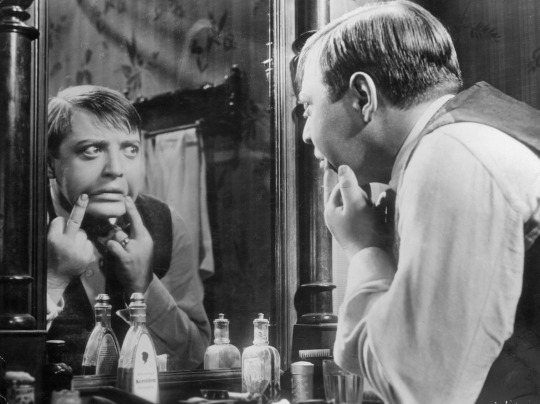
“I always feel it behind me. It’s myself. And I follow me. In silence. But I can hear it. Yes, sometimes it’s like I’m chasing myself. I want to escape from myself. But I can’t!” —Peter Lorre as child-murderer, M (1931)
There was a period in the ‘60s and ‘70s when you could barely call yourself a male movie star if you didn’t do a scene where you stared at yourself in the mirror, doing various “private” things. The device shows up before then, too, but the floodgates opened in the ‘60s and ‘70s. Meryl Streep has observed, “Often the scenes that are the most exciting, and most illuminating in film, are the ones with no dialogue…where a character is doing something alone, where the deepest most private self is revealed or explored. Exposed.”
Mirrors have multiple thematic uses (as well as the obvious directorial choice to add visual interest to the frame). But if a character is inarticulate, then seeing him “deal with” his reflection can fill in some gaps. It’s a great storytelling shortcut. If the character has a firm public “mask,” a “mirror scene” can let us see who he is when no one is watching. We all lie, to some degree, out there in the world (or on social media). We construct a “self” and a mirror scene allows the character to strip that away.
Speaking stereotypically (or, in archetypes), what is expected of male characters in terms of public persona is different from the pressures on female characters. Not better or worse, just different. Crying, showing uncertainty, weakness, vulnerability … can be a minefield. This is why the glut of male mirror scenes in the 70s makes a kind of sense: as the women’s movement rose, men began to wonder about their place, as well as buck against some of the gender norms imposed on them (or, in some cases, re-entrench said gender norms, Travis Bickle’s “You talkin’ to me” the most classic example).

Shakespeare’s use of the soliloquy—in particular for Kings and prospective Kings—could be seen as mirror scenes, with the audience as the mirror. A man goes into a private space, showing the audience things he cannot show on the battlefield or in the court. Hamlet, one of the most introverted of Shakespeare’s characters, showing non-gender-norm qualities of uncertainty and sensitivity, has a massive six soliloquies. (“O that this too too solid flesh would melt”, “O what a rogue and peasant slave am I”, “To be or not to be”, “Tis now the very witching time of night”, “Now might I do it pat” and “How all occasions do inform against me.”) It is impossible to imagine the play—or Hamlet—without them. In Richard II, after Richard is forced to surrender his crown, what is the first thing he does? Like a true narcissist, he calls for a mirror. As he stares at himself, he wonders,
“Was this face the face That every day under his household roof Did keep ten thousand men?”
and throws the mirror on the ground.
Mirrors are powerful and mysterious symbols. The doubling-up can mean all kinds of things. Alice steps through the looking glass into another world. Goethe’s Faust looks into the witch’s mirror and sees a beautiful woman staring back. Dorian Gray takes a mirror to compare his face with the one in the attic portrait. (Like Richard III, Dorian smashes the mirror.) A mirror is crucial in Tennyson’s “The Lady of Shalott,” where “The Lady” is cursed to view the world only through a mirror. But then Lancelot rides by and she can’t help it, she has to sneak a peek. Maybe the most famous fictional mirror is the Evil Queen’s in “Snow White,” the one she asks every day, “Mirror, mirror, on the wall, who’s the fairest of them all?” Richard III doesn’t look for a reflection of his beauty. He wonders where his “self” even is, without the crown.
An early male mirror scene—and one of the best—is Peter Lorre’s in Fritz Lang’s M (1931). Our first glimpse of Lorre’s face comes without warning. As a handwriting-analyst theorizes in voiceover about the child-killer’s psychology, we see him, staring at himself in the mirror. He pulls at his face, slowly, manipulating his mouth into a smile, trying it on for size, maybe seeing what it looks like to the children he seduces. He bugs his eyes out, turning this way, that, a maniacal presence, almost like a shark rolling its eyes backwards as it attacks. He has no sense of what human beings feel like, of what he looks like, of how to even make a facial expression. It’s one of the most chilling private moments in cinema.
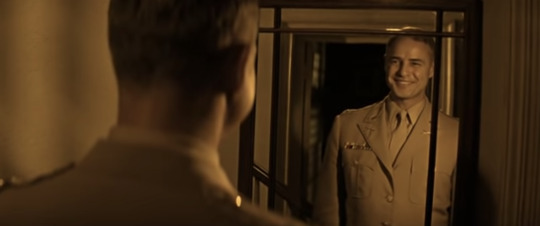
Speaking of “private moments”: Constantin Stanislavski wrote a lot about how actors needed to feel “solitude in public.” He wrote: ”During a performance, before an audience of thousands, you can always enclose yourself in this circle…You can carry it with you wherever you go.” Lee Strasberg developed his “private moment exercise” to help actors achieve “solitude in public.” There are things you do when you are alone which you would stop doing if someone walked in. Maybe you sing along to the radio. Maybe you talk to yourself. Maybe you pick your nose. Maybe you do all of these things simultaneously. Our “public” selves are drilled into us from a very young age. There are “good manners,” there are “contexts” to be memorized—what flies at home will not fly outside the home. Breaking down the public face, letting an audience see who you are when you are by yourself, is part of the actor’s job. (It’s not a surprise that the '70s came to be dominated by private-moment mirror scenes, considering the influence of the Strasberg method on acting styles.)
One of the most important mirror scenes, and a huge influence on Martin Scorsese, is Marlon Brando’s in Reflections in a Golden Eye, directed by John Huston. Brando plays Major Weldon Penderton, a closeted gay man married to a frustrated, luscious Elizabeth Taylor. Late at night, Penderton sits alone, staring at pictures of naked male statues from Greek antiquity. The character lives in an almost totally male world (the military), turned on by young soldiers, and terrified of revealing himself. In one scene, alone downstairs in the house, he walks into the hall and stares at himself in the mirror. After a moment of vacuity, he begins to talk to himself, or, more vulnerably, to an imaginary other person. He pretends to respond to what the other person says, he practices laughing, and he smiles, but the smile is superimposed. He can’t get it to look real. What he says is a kind of murmur, a “pretense” of conversation. This is the kind of vulnerability Brando could achieve like no other. Without this scene, the Major could have been a caricature. All we see is his fuddy-duddy sexless stiff public mask. The mirror scene shows his confusion at how to be a man, how to navigate even a casual conversation.
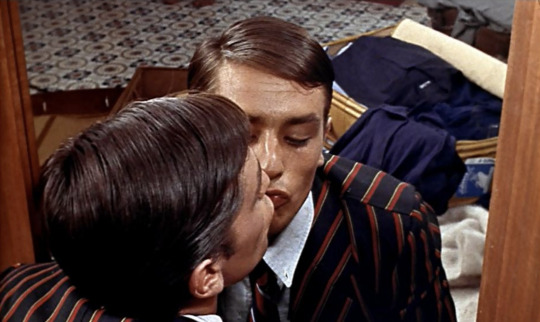
Alain Delon has a stunning mirror moment in Purple Noon (1960), Rene Clement’s adaptation of Patricia Highsmith’s The Talented Mr. Ripley. Delon plays the sociopath Tom Ripley, in thrall to his casually masculine friend Philippe Greenleaf (Maurice Ronet). Delon’s chilly presence onscreen works to beautiful effect: He doesn’t show us much. But then, he tries on Philippe’s clothes, a sleek pinstripe jacket, fancy shoes. He checks himself out in the mirror. Most actors would leave it at that. But Delon understood the homoerotic implications of the script, not to mention the character’s dangerous narcissism. Delon leans into the mirror and gives himself a rapturous long kiss, slitting his eyes open at one point, to check out what he looks like.
It’s interesting to contrast this with the same scene in the 1999 adaptation, The Talented Mr. Ripley, starring Matt Damon. Director Anthony Minghella makes the subtext practically text, by placing mirrors in almost every scene (the final shot of Ripley is through a mirror). When Ripley tries on his friend’s clothes, he dances around to Bing Crosby’s “May I,” doing a vaudeville burlesque. It’s a different kind of rapture than Delon’s swooning kiss. Damon’s drag-style dance is more for the audience, an explicit display of inner gay-ness, what Ripley is hiding beneath his good-natured submissive public persona. It’s a good scene, although I prefer Delon’s. Delon’s kiss is Stanislavsky’s “public solitude”—and it shows the terrifying void within the character. There is no self. The entire world is a mirror.
In Karel Reisz’s gritty Saturday Night and Sunday Morning, Albert Finney’s Arthur, in a whirl of work, sex, and alcohol, is suddenly caught by his reflection one hungover morning. He was beat up the night before. He plays at being a sniper through his window, targeting local women with pellets. It’s a thin line between playfulness and murderous acting-out. Finney digs into this aspect of the character when he suddenly speaks to his reflection. It is a statement of bravado before descending into confusion: ”I’m me and nobody else. Whatever people say I am that’s what I am not, because they don’t know a bloody thing about me. God knows what I am.”
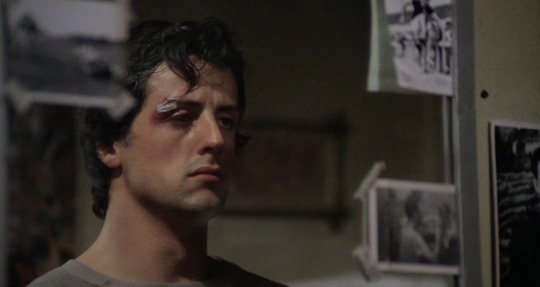
For the opening sequences of Rocky, we see Rocky Balboa’s normal “day in the life.” We are introduced to him through various public selves. But when he goes home to his dank apartment, feeding his turtles, gentle and quiet, his loneliness is so acute it reverbs off the screen. Childhood photographs of him line the mirror frame, and Rocky stares at them, his big-lug face almost crushed in disappointment. Holding a container of turtle food, he starts to talk to himself. What he’s saying doesn’t sound like anything, just private-moment murmurings, but in the next scene, when he goes to visit the girl in the pet store, it becomes clear. He was practicing a joke to tell her, a joke designed to make her laugh, show her he’s a safe person, he’s nice. Rocky practicing a joke in the mirror is one of Stallone’s most vulnerable moments as an actor (and evidence of his gift as a screenwriter).
John Travolta’s mirror moment in 1977’s Saturday Night Fever is star-making, not just because of Travolta’s almost otherworldly gorgeousness (as well as how he revels in said gorgeousness, behavior considered coded-female). Surrounded by 1970s icons—posters of Rocky, Serpico, and Farrah Fawcett—he blow-dries his hair, places gold chains around his neck, and stands like a superhero in his black speedo briefs, shot from below. Perhaps the most revealing thing about the scene is that when his father barges into the room, Travolta’s Tony Manero does not stop what he is doing. His lack of embarrassment tells us everything we need to know about the character.
Francis Ford Coppola’s epic, Apocalypse Now begins with a hallucinatory sequence showing a PTSD-rattled Martin Sheen, holed up in a hotel room in Saigon, tormented by memories. In one shocking moment, Sheen stands unsteadily, and lurches around in front of the mirror, flailing his arms out in imitation martial-arts moves, an attempt to combat his helplessness and anguish, his impotence. But the gap between reality and fantasy is too great, and he, like Richard III, smashes the mirror.
Richard Gere’s mirror moment in American Gigolo is a distant cousin of John Travolta’s. His Julian has carefully crafted an immaculate persona for his female clients, and part of the movie’s pull is watching it get stripped away. At home, Julian wanders around, practicing Swedish, working out, picking out clothes for his next appointment. He’s vain, but vanity is part of his job. Smokey Robinson’s “The Love I Saw In You Was Just a Mirage,” and it’s perfect because Julian literally is a mirage. To his clients, to himself, even. When he stands in front of the mirror, flexing his muscles, he is more Evil Queen than Richard III, a destabilizing of gender norms around male sexuality (and self-presentation) which is so much a part of the film. (When Julian meets a private detective, it’s at a joint called the Me & Me Coffee Shop. Julian’s hall of mirrors shatters by the end of American Gigolo: in the final scene, he talks to Lauren Hutton through a glass partition in prison. The mirror is no more. He can see through it now to the other person, and, crucially, he can be seen, too, as he really is.)
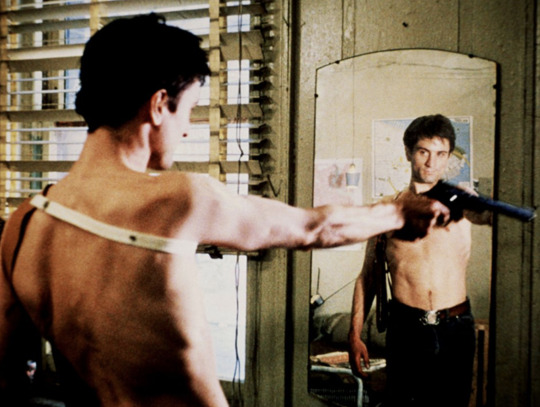
The most famous mirror moment is, of course, Robert De Niro’s in Taxi Driver. In the insomniac voiceover, his Travis Bickle says, “I think that someone should become a person like other people,” showing the character’s alienation from other humans. You aren’t already a person, to Travis: you have to become one. As Travis descends into psychosis, dreaming of 1. impressing the cool blonde (Cybill Shepherd) who rejected him after he took her to a porn movie on their first date and 2. rescuing the child prostitute Iris (Jodie Foster), he begins to amass a small arsenal, putting together boot holsters and straps to go around his wiry body. In the unforgettable moment when he checks himself out in the mirror, he goes into a zone of macho fantasy. (Schrader’s script said only “Travis speaks to himself in the mirror.” De Niro’s “You talkin’ to me” was his improvisation.) De Niro goes so far into his sense of privacy, it’s almost embarrassing to watch. And yet it’s so human, too. (If you say you’ve never talked to yourself in the mirror, or sung in the shower, you’re lying.)
De Niro’s second mirror moment is Raging Bull’s final scene, when the bloated Jake La Motta recites Marlon Brando’s “I coulda been a contender” monologue from On the Waterfront, before standing up and doing a series of “pumping up” exercises, to get ready to go onstage. (Side note: Mary Elizabeth Winstead closes out Eva Vives’ wonderful 2018 film All About Nina, about a troubled stand-up comic, with a re-creation of the scene from Raging Bull.) What’s fascinating about the Raging Bull scene is that Jake La Motta has no “self” to reveal. It’s almost like there’s no inner life at all. He doesn’t “get it.” He never did, he never will. De Niro blanks himself out in a very unnerving way, opposite to the dangerous vengeful-spirit fantasy he inhabits in Taxi Driver.
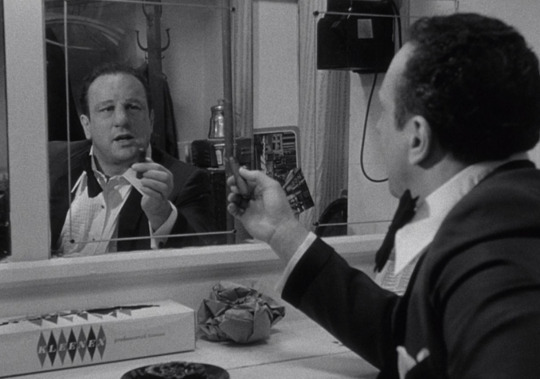
Although Walter Hill’s Johnny Handsome descends into a cliched crime movie with paper-thin characters, the opening sequences are dark, cynical, and atmospheric. Mickey Rourke plays Johnny, a man with a deformed head, an “ugly” appearance which has separated him from other humans. Reminiscent of the Joan Crawford film A Woman’s Face, a caring plastic surgeon (Forest Whittaker) offers to operate on Johnny, to give him a chance at a new life. When Rourke unwraps the bandages and sees his new face (i.e. Rourke’s real face), Rourke has a mirror moment like almost no other, a moment worthy to be placed alongside Brando’s and De Niro’s. He touches his face with wonder, bursting into tears. That’s touching enough, but then, as he glances back at Whitaker, Rourke goes deeper. A look of fear, and lifelong anguish floods his eyes, as he says, “I feel like I still have a mask on” and then, after that, Rourke goes even deeper into a maelstrom of emotion: gratitude, bafflement, awe, despair. The scene is Rourke’s finest hour.
Up until recently (with a couple of exceptions), when women stared at themselves in the mirror in the movies, it was obvious what they are doing: touching up their makeup, checking out their mask. Once again, in the 1960s and 70s, women started doing “mirror scenes” equivalent to men’s mirror scenes, where the purpose was not perfecting the public mask, but to - as Sylvia Plath wrote in her poem “Mirror” - search “my reaches for what she really is.” Faye Dunaway has a great one in Jerry Schatzberg’s Puzzle of a Downfall Child. Gena Rowlands has quite a few “mirror scenes” in the movies she did with Cassavetes (there’s a couple of stunners in Opening Night). In my favorite moment in Sofia Coppola’s The Bling Ring, after breaking into Paris Hilton’s house, Katie Chang goes into a daze of mad-woman fantasy, staring at herself in Paris’ mirror. It’s not hard to imagine the character slipping into the Manson family, if a Manson came along. She’s as blank as Jake La Motta. In La Verite’s opening scene, Brigitte Bardot stares at her face in a broken shard of a mirror, right before marching off for her court date. Her “self” is fragmented, broken. Jennifer Jason Leigh has an extraordinary extended “mirror scene” in Georgia. The moment is everything: self-hatred, rage, searching and longing, and bone-deep narcissism.

Men staring at themselves in the mirror let us into their secret worlds, their fantasies and anxieties, uncertainties and vulnerabilities. It’s not about being self-obsessed. It’s trying to find the self, the self that is not allowed free rein, be it a benign self or a malevolent one.
In Caravaggio’s “Narcissus,” Narcissus leans towards his reflection in the water, his posture pulled downwards with a seductive tug. He braces himself by his hands on the ground, and his knee, bulging out beneath his torso, is the only barrier between Narcissus and his reflection (and, perhaps, drowning). In the painting the reflection below is cut off; all we see are the forearms and that gleaming sturdy knee. Even though Narcissus’ body is barely visible, even though he’s hunched over himself, his energy is childlike, soft and open. He gives his reflection a caressing stare, a swooning look. He yields. This is not just vanity. This is something else.

#musings#film writing#film essay#oscilloscope laboratories#beastie boys#adam yauch#independent film#mirror#taxi driver#robert de niro#Martin Scorsese#american gigolo#fritz lang m#peter lorre#the bling ring#sofia coppola#shakespeare#richard ii#saturday night fever#john travolta#rocky#sylvester stallone#gena rowlands#faye dunaway#marlon brando#reflections in a golden eye#raging bull#jake lamotta#johnny handsome#mickey rourke
43 notes
·
View notes
Photo









Bloody London Character Task ; 004 - Sorting Hat
S l y t h e r i n
“And power hungry Slytherin, loved those of great ambition.”
Wand: Vine wood - 9 ½"- Dragon heartstring core - Pliant flexibility Patronus: Badger
#blrptasks#slytherin#moodboard#slytherin aesthetics#slytherin moodboard#philippe: the inner workings of your being
5 notes
·
View notes
Text
On The Dreamers In Toy Story 4, Buzz Lightyear finds his “inner voice” in the buttons on his chest which when pressed relay different catchphrases or soundbites that he can immediately act upon. Thus there is an axiomatic quality to his decisions and the inner voice is seen as outside you - you can press the button but the phrase is not chosen. The father’s inner voice in the movie is clearly his GPS. Either way, toys and humans have both inner and outer voices, they model the world, autonomously. The game of giving and asking for reasons begins not only with other self-conscious beings but with regards to oneself and how one interacts with the call of the repeatable inner voice that is modeled on one’s outer voice. One can realize there is no difference when Andy voices Buzz or when Andy voices himself and becomes his own toy.
“Name a film.. / Which film?” Any action or saying, or saying as a doing, has a possibility of already being in a film, which is to say repeatable, and possible to treat as an axiom that can be launched in any situation, without any regard to the situation itself, like Buzz pressing his own button. Is there a point where we need new inner voices, new buttons? Of course, the inner voice in this regard can be wrong for the situation it appears in, but that may mean reality is wrong, the idea is right, and the button should simply be pressed again in a different situation. But is there anything worth repeating in French cinephilia’s love for American pictures, or Americans caught in this same French projection of themselves? As Andrew Tracy once noted, on an artistic level it is clear that there are not many masterpieces in American movies, only some great moments, often crushed by some exterior or interior compromise, a lack or difficulty in differentiating inner and outer voices.
Cinema, an art that appeared to have some sort of prelapsarian relation to reality, in fact bars itself from reality by such an assumption of fusion. In fact, Matthew and Isabelle learn more about what is going on in the street by briefly catching it on TV. No amount of film watching “all of a sudden” links up with reality, there is nothing in the films themselves that can tell you anything. If one believes the sophistry that there is no difference between critiquing and making a movie, and that there is no difference between movie and reality, you end up in a suicidal position of gassing your living room while dreaming of Bresson. (This is also something one may unfortunately claim of Ossos.)
Godard’s critique of American cinema is as crucial to his System as Plato’s critique of democracy is to his own. It is a recipe that can be updated but it is not to be simply jettisoned because it is opposed to liberal tastes. It has recently been argued that today’s “opium of the people” is both “the people” in the sense of populism, and “opium” itself, and one can easily tie this to the notion of a Hollywood (”independent”, “foreign”, or otherwise) narrative that’s “for the people”, or else we have the fragmentation of someone like Philippe Garrel to stand for the position of “opium”. If today’s pornography is often crowdsourced, where comments and data trails allow a company to create their scripts that directly copy consumer desires, and the actors do not know their lines or know any details until they get to the set, then it should be clear that if the production of Last Tango in Paris was critiqued for last minute script changes or withheld details in pursuance of a dated idea of “getting into character” and “surprise” from the actors, today it is absolutely normalized, and instead given a “democratic” spin, our ultimate fetish. Either way, “story” appears from the American standpoint to be the only way to model our reality, especially if, in this particular example, the sex remains more or less the same, the narrative being an excess that does nothing but give us the seed to live the most stupid Aristotelian lives. And again I’m not arguing for opium-based fragmentation to mimic one’s sense-experience, nor am I claiming we should fight narrative because it is a “totalizing practice” or that totalization is already evil and totalitarian - instead it’s that both forms of story are not abstract enough to hold any traction in thinking either politics, sex, or art today.
The cinephilic mistake is not in the fact that the films they imitate in their daily life are too far removed from “lived experience” and have no relation to their social reality- in fact, this is the strength of cinema. If the highest levels of imagination could be recalled at the press of a button on one’s chest when one needs a sort of compass then this would be one of the better uses of movies. For in fact, there is nothing more impoverished than “lived experience”, whether it’s a conservative claiming that superhero movies are bad because they don’t mean anything to our real lives, or whether it’s some sort of liberal-leftist who demands more stories told in first person by those who are historically excluded and yet in the very form will take moves from world cinema and yet claim any litany of reasons why universalism doesn’t exist and particularity is all that matters. But other systems can be imagined - if a new form is invented, outside of either opium or people, the link of being able to ‘live’ a movie can be closer to realizing philosophy ‘in practice’. That is, today and yesterday’s ‘cinema’ is too close to so-called ‘real life’ to be worthy of imitation.
Kelley rightly claimed the movie allows us to think the crucial difference between siblings and comrades, and such a confusion can lead to what Zoohky called those “who want to enjoy art but not make it, enjoy the catharsis of protests but not do the work of politics [...] what u may think is sexual exploration, may in fact be the repression of it; what u may think is political engagement, may in fact be the repression of it; what u may think is artistic celebration, may in fact be the repression of a formal event by which the world could be reshaped forever.” Despite the insularity of the movie’s characters, there’s something worth holding onto that is implicit in the film's locale: simply being American does not give you special insight into American movies, and the experience of French-Maoism is not simply a call to a return of only understanding politics from one’s own local standpoint. But this also goes for the French experience of May ‘68 - they may not be the best people to inquire about its political consequences and bequeathals. We are comrades of Ideas, and not merely an Idea’s sibling.
The brick that comes through the window saves the three children by waking them up and ultimately allowing them to live, but it also allows them to keep dreaming that they have any relation to a real historical movement that isn’t mere incest and trivia. In that sense the breaking of the window may be a dream sequence on par with 1900′s ending of De Niro and Depardieu rolling around comically fighting until the end of history.
21 notes
·
View notes
Text
The Field Guide To The North American Teenager by Ben Philippe

When Norris Kaplan moves from Canada to Austin, Texas, he is none to pleased. For a black french-canadian, Texas doesn’t seem all too welcoming. All Norris wants is to make it through his mandatory “please try” phase with his mom before being able to back to cold, snowy Canada and his best friend Eric. Despite his best efforts to stay under the radar until spring break, his plans seem to epically fail for multiple, totally unavoidable reasons. But Norris slowly starts to find his place in Austin. He finds a job at a local restaurant, makes friends with a weirdly chill dude with a strange wish to learn to play hockey and his new boss’ daughter, and maybe he’ll even find a girlfriend in the strange artsy girl who seems all too fascinating for Norris to ignore, all while jotting down observations about the workings of the American High School system and the students who are part of it in his small notebook (helpfully provided by his school counselor). Although Norris’ Field Guide to The North American Teenager might seem silly, it’s Norris’ new life and he has to navigate it somehow, especially when his smart mouth tends to get him in trouble.
----SPOILERS----
This book was awesome. It made me smile and laugh and served up some Percy Jackson-level sass and hilarious chapter titles. I loved the sarcasm, like, oh my god. I wish I was that snarky. But seriously let me tell you, from the moment I picked up this book and read the blurb on the book jacket, I felt for Norris. He moved from Canada where everyone's one joy in life is hockey (sorry for the stereotype), to Texas, where everyone's one joy in life is football (not a stereotype). I also really loved that he wasn't your stereotypical white narrator in a slice of life YA novel, I feel like those types of books are a dime a dozen these days and they don't offer up nearly as many laughs as this one did. Norris is a pretty cool main character overall, his inner monologue and his voice for that matter is just so incredibly sassy. Sassmaster to the max. Also Liam's character? Absolute gold, an “aggressively chill dude” with an actual backstory and he isn't a stoner, it’s what I aspire to be in life (joking but not really). Eric was also a pretty good character even if he was pushed to the back burner a bit. I also love the relationship he has with his mother, it’s the kind of real fun stuff that good parental relationships are made of, it was also great to see him on better terms with his dad by the end of the book. The incorporation of modern issues is relevant and seamlessly scattered throughout the text. Obviously, you can’t ever read a book without having a few issues with it. For one, I thought Norris’ thing against Ian had practically no basis as nothing really went down between them, and I get that Norris has this thing about comparing American high school to eighties movie high schools but I feel like it either should have been played up more or not brought up at all. It tended to come up at random moments that if you weren’t familiar with those movies, you’d have no idea what he was talking about. But onto more positive points! One thing I really liked about this book, although I’m sure some will disagree with me, is that Norris didn’t really have an endgame. Sure he really liked Maddie and his ultimate goal for his remaining time in Austin is to woo her and have the best senior prom ever, but he didn’t have some big internal crisis over Aarti and Maddie that made him do stupid shit, and in the end, everything was perfect and cheesy and cliche. I just love that. Again, not your normal slice of life story. Overall this story was wonderfully written and bound to make you laugh, no matter how many times you kind of want to reach into the book and slap Norris upside the head. Definitely, 10/10 would recommend you give it a read when in need of a good laugh.
-maren
#maren reads#YA#YA novels#YA Books#YA Book Review#the field guide to the north american teenager#ben philippe#books#bookworm#booklover#book review#bookish#book nerd
2 notes
·
View notes
Text
A Mind Control Marathon

By Philippe Hannetelle
We are walking through this movie since almost two years now. Yes, it´s a marathon for each living being on this planet. Some are more affected than others depending on the country they live in and their state of consciousness, in balance or not.
Everyone is a creator, whether the person recognizes it or not, and this particular moment of our existence, we created it together, it is a call for everyone's consciousness to wake up from their societal trance, for everyone to become aware of their creation and the suffering they inflict on themselves and others through their selfish, angry, jealous, manipulative behavior.
It is because people don´t want to change in their consciousness, insisting to look through the levels of their consciousness in which they don´t see the world as it is but as they are, we say that they are lost in the mirroring aspects of their consciousness.
There is this separation in ourselves, between our emotions and our will, our feminine and masculine side, our yin and our yang and this is reflected in our societies with the opposition man-woman, and all these movements that show themselves so that we see the disharmony of our consciousness, the fires, the floods, the temperatures that fluctuate from one extreme to another, the terrorism, the wars. But until now many are still caught in the fog that occupies a large portion of their consciousness because they are not aware or don´t want to see their motivation behind their actions.
And there is so much suffering in this physical reality, human suffering and animal suffering and mistreatment of nature. As a canadian free-lance journalist, Guy Crittenden, wrote in his article “Covid and the Law of Karma”- a karmic debt built up over decades of US imperialism (and other insults to human decency), which sprouted dreadful vines from the bloody soil of centuries of unimaginable exploitation and genocide - and as Martin Brofman in his book “Anything can be healed”, in the chapter “Karma and healing” - consider the energies you have been putting out, because now you know what it feels when it comes back-.
This is the moment at which you take mastery of your life and, going out of the victim state, you ask yourself why you have attracted the situation or event into your life and you start to work on yourself to change your inner. As you transform yourself, the outer world is going to reflect this. Seeing yourself as a creator and going beyond the veil of illusion.
For a lot of people, life is difficult and full of rollercoasters experiences, and they are seeing themselves as victims, saying „poor me, I am so unlucky”, but when you awake to who you really are, a consciousness, a soul, you recognize you are responsible for your own journey. Then you finally let go of all victim consciousness and stop blaming, judging, hating and projecting onto others.
The acceptance levels have increased towards the basic idea of these methods saying that we are each a creator and everything begins in our consciousness since I began teaching The Body Mirror System and The Vision Workshop 31 years ago. There have always been parts of the society open to these ideas, though now, with the popularity of healing methods, the idea has come to be accepted more within the mainstream parts of society. While at first, examples like Martin Brofman´s healing were considered extraordinary, there are more and more people who have done the same thing, either healing themselves, or being healed with various non-physical tools.
I remember talking in the 70ies with Pierre Besson, a nephew of my maternal grandmother about all these ideas. He introduced me to all these philosophiess and recommended books to read from Yogananda, Spalding among others. He was a famous dowser in France in the 60ies-70ies and he analyzed with his pendulum a blotter where the person had put saliva and he was looking for the organs that were not functioning well, pointing out symptoms and giving homeopathic drugs. He wrote a book “Homme ou Dieu” (Man or God) in the 50ies in which he explains we are creators, we are unlimited and we are able to do and change everything, but until now most human beings chose the limitations and put their focus on the physical reality and so live under its laws (biology, chemistry and physics).
According to Quantum Theory, for example, the observer of an event affects the event, depending on how they observe it – showing the power of consciousness over events in the physical world. This reinforces the understanding in consciousness exploration that our perceptions create our reality.
We are spiritual Beings existing in a physical Universe – so that the more we understand both, and how they interact, the more we understand ourselves and the true nature of who we are.
We are currently in a period of time where outer events are difficult, a lot of solar plexus energy, reflecting a lot of tensions in the group consciousness and a bounce against the membrane between the Solar Plexus Chakra and the Heart Chakra, moving from Control to Acceptance. We have to ask ourselves why we drew this experience and we can see these events designed to stimulate a change, if it does not happen in a gentler manner.
There are more and more individuals voicing and demonstrating their displeasure at feeling controlled by people that have not been representing the interests of the group and the individuals in the group consciousness.
Evolution anyway is inevitable. For the evolution process to be more gentle, it needs for people to jump out of the victim role, and by raising their perceptions to the heart chakra, looking at everybody, including themselves, with more compassion, acceptance, seeing the entire world and all the perpetrators of injustice with eyes of love. We each are on this path of our own evolution, and we can experience life through deeper places in our consciousness. That´s the reason to go beyond the mind, to make the unconscious conscious.
We always have the choice as to whether we will interpret these events through the filter of Security, Sensation, Freedom or Power, Love, Expression or Abundance, Spirit, or Unity. We have these seven different channels on our screen and most people are still caught in the first three channels, these three first levels of our consciousness, where if you experience tensions, thus you see the world through a filter of insecurity, or emotionally trapped, or imposing your power or controlling yourself.
Because, until this moment of our experience, what was hypnotizing people were the work-eat-entertainment cycles and it was fascinating to see that a lot of people were not wondering what we do on this planet and had no desire for a deeper understanding of our purpose in this universe.
Everyone should know about their role as a creator, the relationship between their thoughts and emotions, and the consequences it has in their body, and the importance of living consciously. It allows you to be happier and to create consciously. It is like a User's Manual for the equipment we came to earth with, and unfortunately, until now not enough people know how to use it or not fully and for some people, even if they read the Manual, they don´t use it or don’t understand why things go wrong with it. It should be taught in schools, as meditation is now proposed in some schools in different parts of the world. (Martin Brofman)
It allows us to see the events in the outer word as a cocreation of the different Spirits involved in the events. Until now the vast majority of people living on the earth are violent – violent with their thoughts, their words and their actions, they don´t want peace, neither do the governments, they sell weapons, they prepare for war, and in the same way religions have not given man peace, we have all created that and therefore there is no peace on earth until now.
When there are enough people in the world understanding these concepts to help themselves and those around them, the world will be a better place.
So here we are in a temporal continuity where we experience our own separation. And every day brings its share of contradictions where the mind does not know where to turn.
Human beings are running around in all directions, both in physical reality and in their consciousness, caught up in a frenzy of reactions, like a nest of ants that has been disturbed. But where are they running to? Few know, and if they did, they would surely stop running, although it is not even sure.
Since the beginning of 2020, we have been in a mold that we have made ourselves. Convinced that the physical reality is the only one that exists, people are motivated by fear, which is underlying in all their ways of reacting.
So yes, as science professes, a virus can create diseases and the one called corona is no exception to this rule. And since one trusts science, one looks for an external solution and, since preventive treatments have been ignored, one has turned to forced vaccination, while saying that it would not be compulsory. The facts prove the contrary and the turn of the screw becomes more intense to force people to bend their backs in front the steamroller of the laboratories and the policies that are implemented.
People who advocate other ways of changing things are belittled, seen as troublemakers, conspirators or other demeaning names. Even caregivers, doctors or nurses who do not follow the official orthodoxy are excluded. We have entered a dense physical reality where control and fear go hand in hand.
There are solutions, but the profitable business of the laboratories and their relentless lobbying, as well as the lack of vision of politicians, means that we are going backwards rather than forwards.
What are the solutions?
This starts with education, and changing the way education is practiced, now it´s a competitive education, where you have to be the best to please the parents and the dreams they have set for their child. There are alternative schools, but the lack of support for this kind of education and the suspicion towards them, makes that the children continue to be educated to work in order to be profitable for the society.
Teaching children to meditate, to communicate without violence with others should be the basis of any education worthy of the name.
And teach from childhood that competition is the root of all wars and that it is important to respect other opinions and create unity rather than separation.
Encourage the body's natural way of healing itself, through meditation, yoga, plants, all the so-called "alternative" medicines.
Teach people that they are not just a physical body but a Spirit in a body and teach them to feel the energy, to direct it with their consciousness in order to heal themselves and others.
Teach that everything has a consciousness and that we are all connected, and learn to relate to the consciousness of all that exists.
Understand that all symptoms in the body or all the experiences in our life are the physical manifestation of what we do in our own consciousness. We are individual consciousness and all together we form a group consciousness, and in the same way an individual consciousness can be out of balance, a group consciousness can be out of balance. There is the group consciousness of a family, of a town, of a country and if you let yourself be affected by the out of balance condition of a group consciousness, you become yourself out of balance and if you continue in the same direction, you will create a symptom in your physical body. So, when you understand the body-mind relationship, the place where the symptom is located will show you what you need to do to come back to balance, to be healed. And anything can be healed!
If you show me someone with a symptom, I will show you someone who is unhappy about something. If people got what is called “Covid” or got secondary effects after a jab, it means they have tensions in their consciousness about something happening in their life at that time. It raises questions about the conditions in the group consciousness that contributed to the situation, and the degree to which the individual accepted the beliefs and/or values that contributed to the symptom.
Looking at the different possible symptoms, we can have an understanding about the different tensions in their consciousness and what people need to do to come back to balance and e healed.
Fever
Fever implies anger. The element associated with the solar plexus chakra is fire. The person is angry about something happening in their life.
Headache
A headache generally points to tensions in the crown chakra, and therefore with father and/or authority, or a sense of separation from someone. A headache at the level of the forehead, however, points more to brow chakra tensions and something happening in the person’s thoughts/feelings about spirituality or religion, or not feeling seen as the person inside the body.
Fatigue
Fatigue in general or experiencing low levels of energy reflects root chakra tensions about money, home, and/or job, or other root chakra tensions (survival, trust). The person can ask him/herself what they are “tired of.”
Cough
The irritation might be in the chest or in the throat. When it is in the throat, it can be associated with unexpressed anger, and the person feeling irritated about something. When it is in the chest, it points more to tensions or anger with someone close to the person’s heart. When someone coughs, they are pushing away air, the element associated with the heart chakra. A person’s relationship with air is reflecting their relationship with love, and the person has therefore been pushing away someone’s love, feeling angry with someone close to them.
Diarrhea
Diarrhea is the frequent passage of loose, watery, soft stools with or without abdominal bloating, pressure, and cramps. It reflects tension in the root chakra, and insecurity or fear as a perceptual filter.
Sore Throat
A sore throat reflects unexpressed anger, and tension in the throat chakra, which is associated with expressing.
Nose
The nose and the sense of smell are related to the root chakra and therefore to the parts of the person’s consciousness concerned with security, and that which represents security in the person’s life – money, home, job, mother. Tensions in the root chakra are experienced as insecurity or fear.
Lungs
The lungs are associated with the heart chakra and the area of relationships in the person’s life. Symptoms affecting the lungs affect the person’s ability to breathe. The element of air is associated with the heart chakra, and a person’s relationship with air reflects their relationship with love. One can then see the parallels with difficulty allowing it in, or difficulty expressing, in terms of what was happening in the person’s life when the symptom began.
- Systemic inflammation of the blood vessels: anger reflecting tensions in the heart chakra and in the circulation of love.
- There are also reports of skin problems, the skin is connected to the solar plexus chakra and the aspects of freedom, power, control. If it is a particular area of the skin that is affected, we say that it is a solar plexus energy (anger, rage) at that place.
Loss of taste - associated with the orange chakra and food, sexuality, willingness to be in touch with the emotions.
If the conclusion of the symptom is death, it shows that the person has decided that the situation they are in is unacceptable, and that they would rather die than continue with that situation in their life. For them to decide to live, they must resolve this tension or the situation so that they have something to look forward to, something to live for.
Martin Brofman – The Inner Cause
Until now, the answer to Covid is vaccination, this is the credo distilled more and more loudly by governments, scientists and doctors, but not all of them, some see vaccination as counterproductive and deplore the absence of preventive treatment, they are forbidden or discouraged and natural treatments, plants, homeopathy, etc. are excluded and denigrated. Everything that could be beneficial for health is closed - for example saunas in Germany, fitness and sport centers, swimming pools and so on.
All this keeps us in one answer, the allopathic answer, where causes and effects are outside of ourselves.
The mind-body connection is not even considered, it is not even mentioned. We have reached a society of absolute control, where compulsory vaccination is in the pipeline in different countries, with an exclusion of people who do not want to fit into the manufactured mold.
We have created as human beings, rulers who are caught in the mirror effect of their own perceptions and decide that they are the absolute truth. We are overwhelmed with statistics, numbers, that say what we want them to say.
We know that the solution is in ourselves. Now it´s the time, change inside, you are the dreamer dreaming the dream, what do you really want?
Dream a peaceful change and remember that intention is one thing, but action is necessary.
Philippe Hannetelle
Source: Martin Brofman
https://www.innertraditions.com/books/the-inner-cause
Source: Guy Crittenden
1 note
·
View note